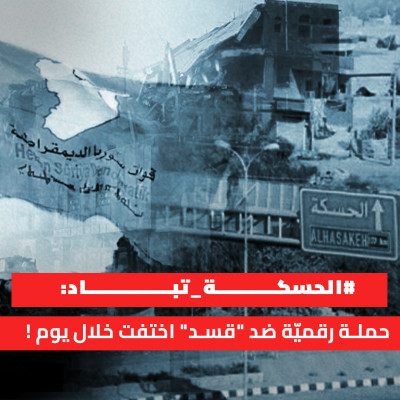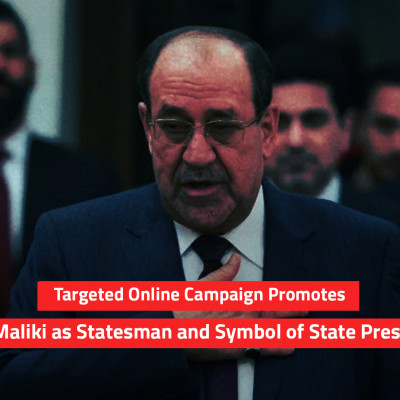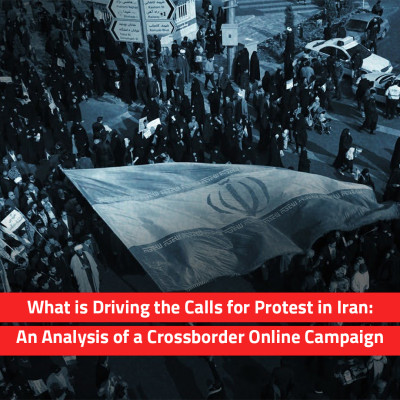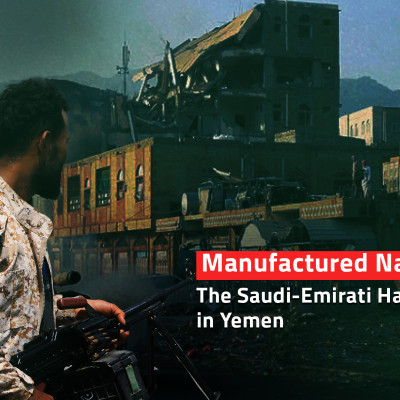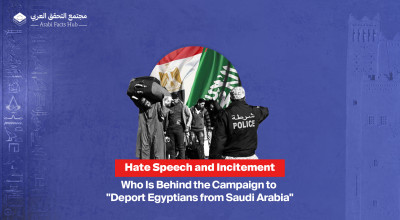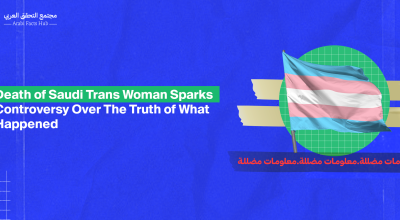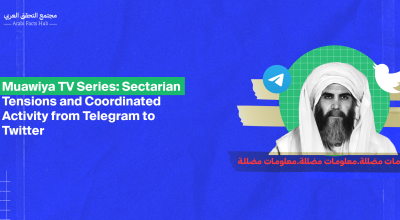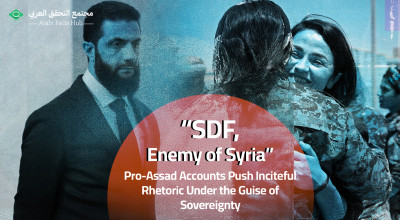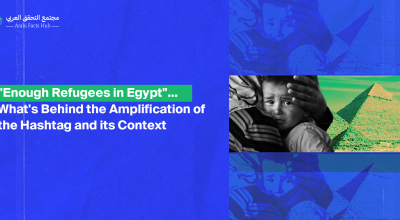Dismantling “Sharaa’s Electronic Army”: Saudi and pro–HTS Accounts Fuel Fake Online Hype
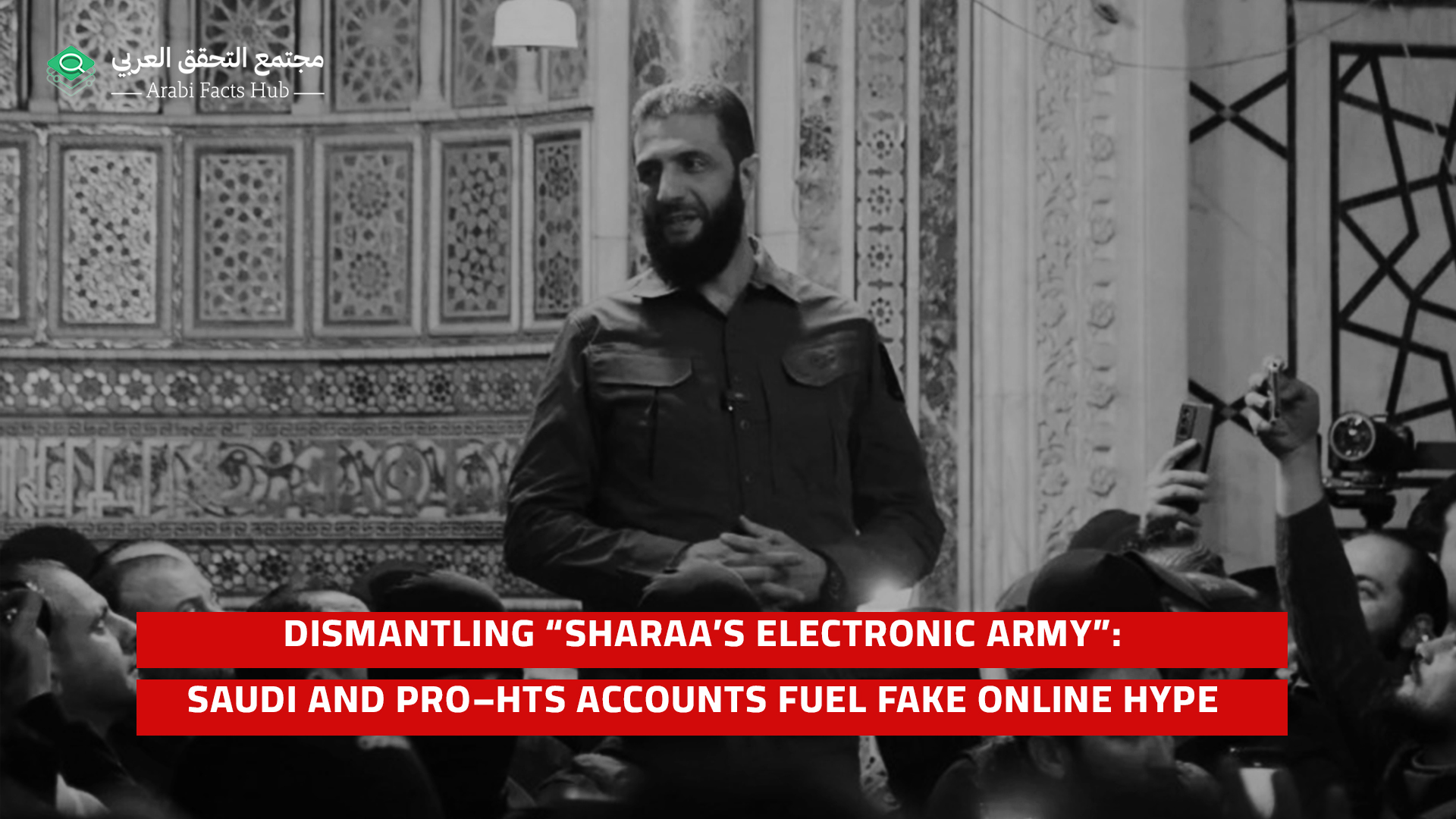
Ibrahim Hilal
Following the collapse of former Syrian President Bashar al-Assad's regime, brought about by a large-scale offensive led by Hay'at Tahrir al-Sham (HTS) and the rise of Ahmed al-Sharaa (previously known as Abu Mohammad al-Julani), new hashtags emerged online. These hashtags, such as such as: #يداً_واحدة_ضد_الذيول (One Hand Against the Cronies) and #كلنا_احمد_الشرع (We Are All Ahmed al-Sharaa), expressed support for the new Syrian regime.
Over time, electronic blocs supporting al-Sharaa formed, especially after he assumed the position of interim president of Syria. These accounts consistently supported his policies and opposed his detractors.
Arabi Facts Hub dismantled this network, which is particularly active on the hashtag "#كلنا_احمد_الشرع" (We Are All Ahmed al-Sharaa) and found it to consist of Syrian accounts opposing the Assad regime, and others previously belonging to Jabhat al-Nusra and Hay’at Tahrir al-Sham.
Accounts from outside Syria, especially from Saudi Arabia, were also seen using the hashtag to describe al-Sharaa as a "wise politician." In addition, fake accounts intensified pro-Sharaa propaganda, using sectarian incitement and hate speech to attack his opponents.
Blowing the Whistle: Birth of the Hashtag
The hashtag كلنا_أحمد_الشرع (We Are All Ahmad al-Sharaa) appeared on January 3, 2025, through the account of Alaa al-Hashimi (@hamoud76394592), a Syrian user who identified himself as being from Idlib and the Syrian tribes. The account shared a video of al-Sharaa’s meeting with the German foreign minister, using the hashtag.
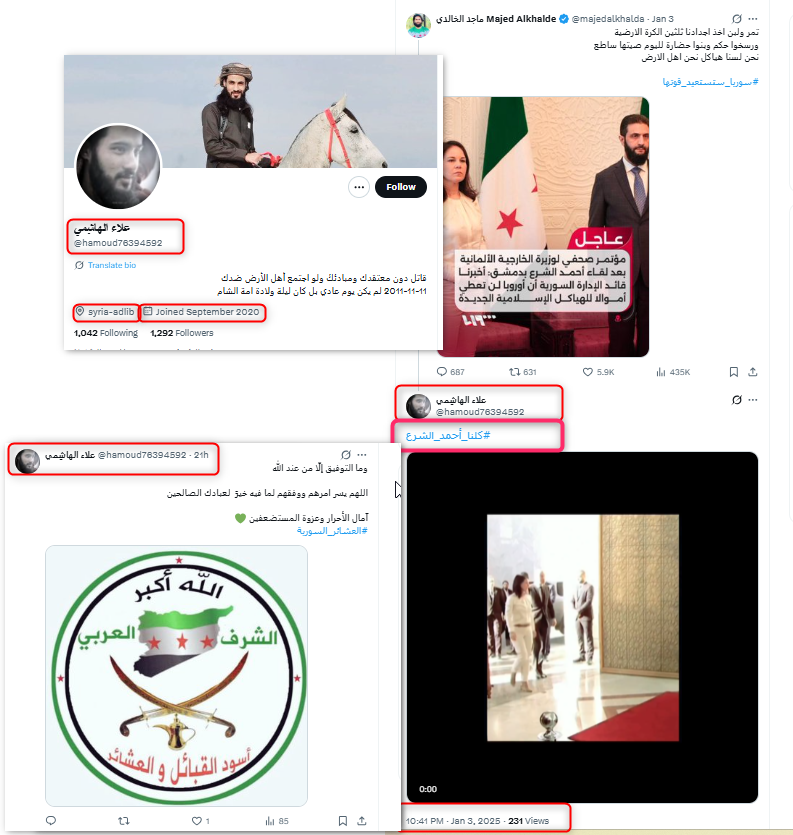
On January 3, 2025, one account commented with a video showing interim president Ahmad al-Shar’a’s meeting with the German foreign minister, adding the hashtag #كلنا_أحمد_الشرع (We Are All Ahmad al-Sharaa). That marked the first appearance of the hashtag in 2025—nearly four months after the fall of Bashar al-Assad’s regime.
On January 22, 2025, the account al-Hussein bin Ali (@OmarFaroq2022) reused the hashtag in a comment on a post about the new regime’s “violations,” describing the post as an attempt to distort the Syrian revolution.
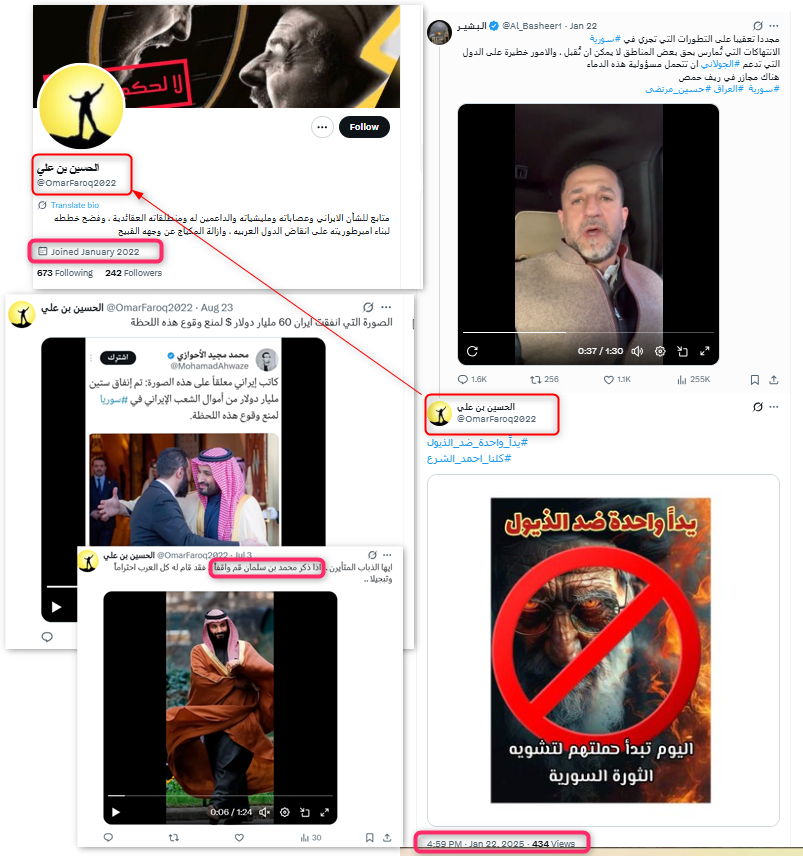
The account described itself as “a follower of Iranian affairs, its gangs, militias, supporters, and ideological foundations—exposing its plans to build an empire on the ruins of Arab states and stripping the makeup off its ugly face.”
Despite its clear support for al-Sharaa, the account was clearly Saudi, as all its content focused on political promotion of Crown Prince Mohammed bin Salman and attacks on Iran and Saudi Arabia’s adversaries.
The account posted three identical entries on January 22, 2025, at different times throughout the day.
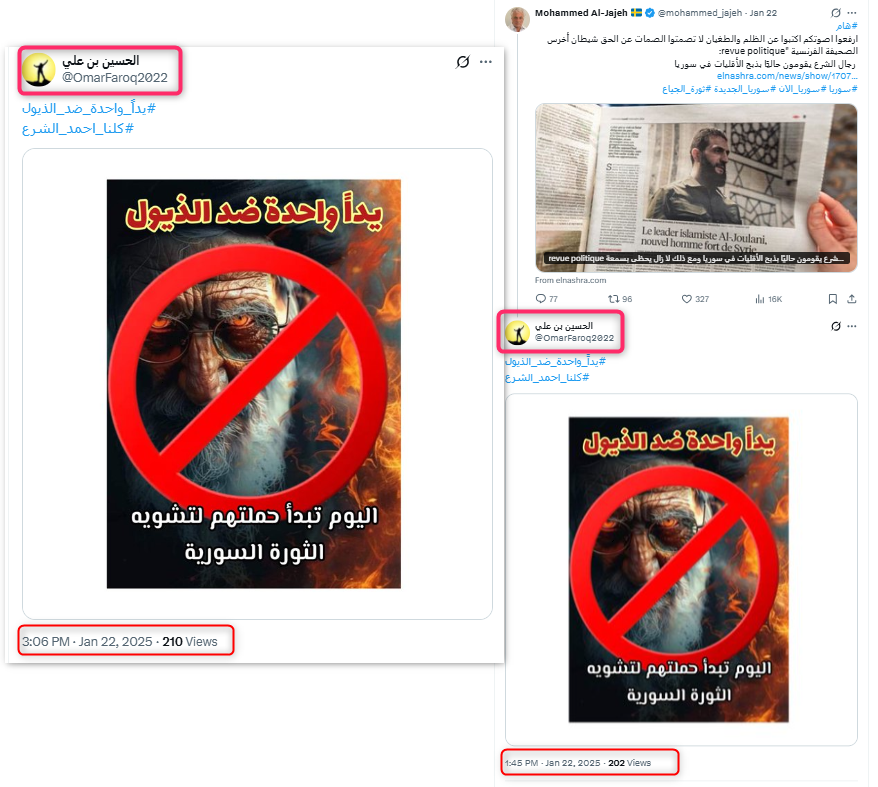
Then, on January 25, 2025, after demonstrations erupted in the Syrian capital, Damascus, to protest Israeli attacks on Syria, the account of Syrian journalist Joud Akkad posted a video from the protests showing a man chanting for the removal of al-Julani—the name previously associated with Ahmad al-Sharaa.
The video was later reposted by an account named al-Saif (@alsaif_ku), which included the hashtag #كلنا_احمد_الشرع.
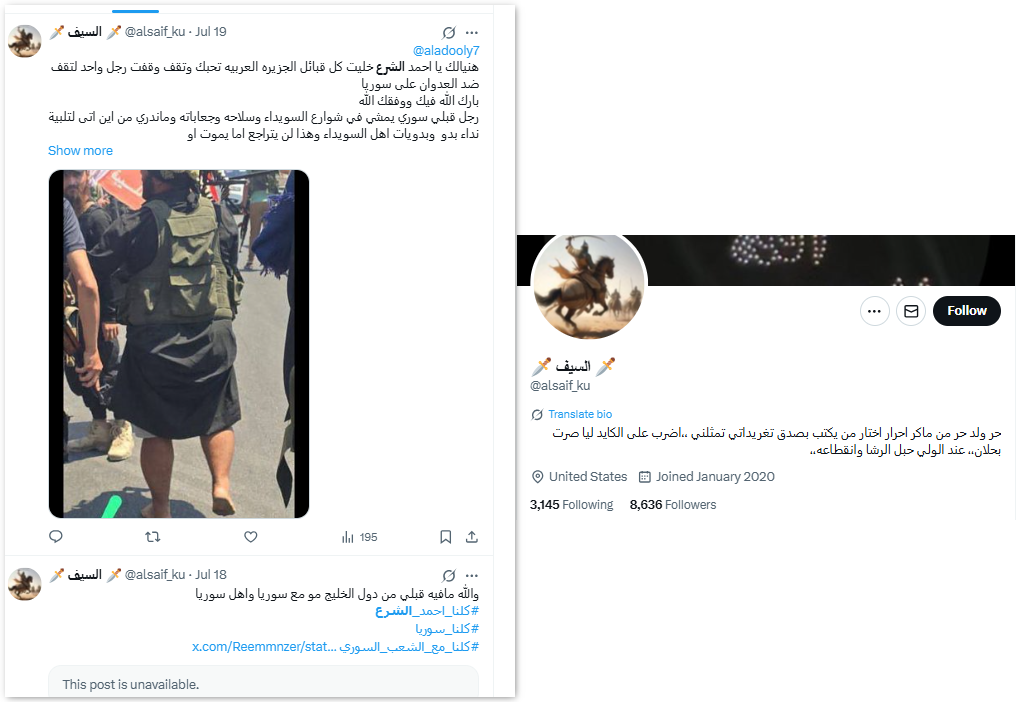
The account "Alsaif @alsaif_ku" is not Syrian; rather, it appears from its posts to be a Gulf account that supports the ruling regimes in the Gulf, and like the previous account, it focuses on attacking Iran.
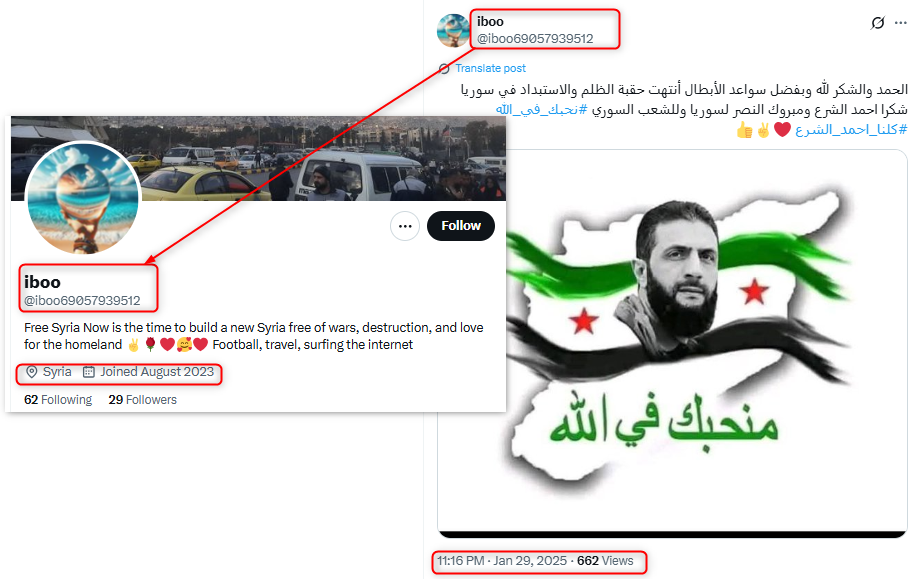
By the end of January, the same hashtag #كلنا_احمد_الشرع (We Are All Ahmad al-Sharaa) appeared again on two Syrian accounts. The first, created in 2023 and named (@iboo69057939512), appeared to be a fake account, judging by its username.
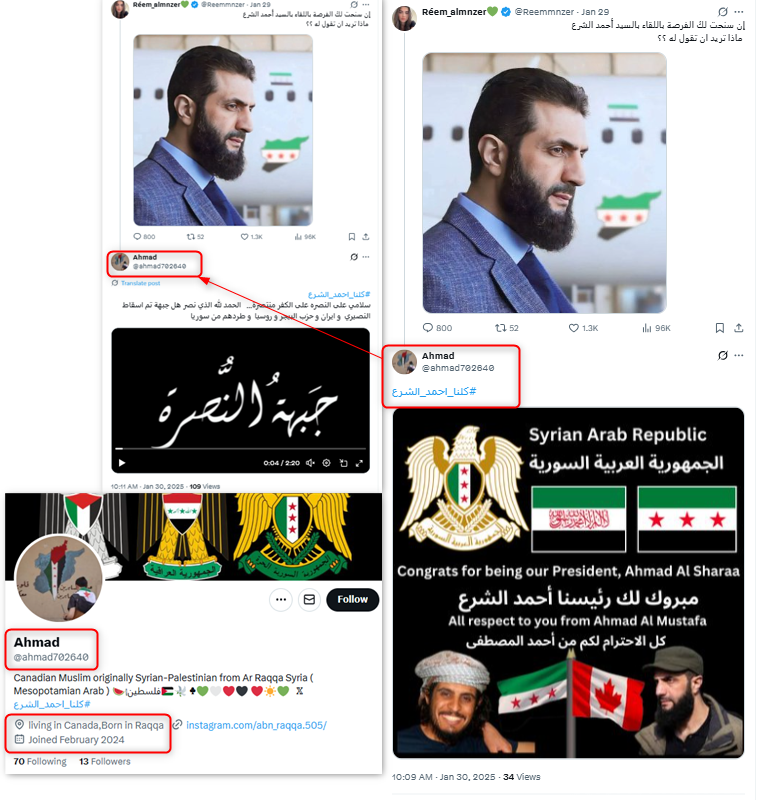
The second account, @ahmad702640, belongs to a Syrian individual living in Canada. The recently created account was used to express support for Jabhat al-Nusra, the faction previously led by al-Sharaa. This faction separated from al-Qaeda and subsequently became part of Hayat Tahrir al-Sham.
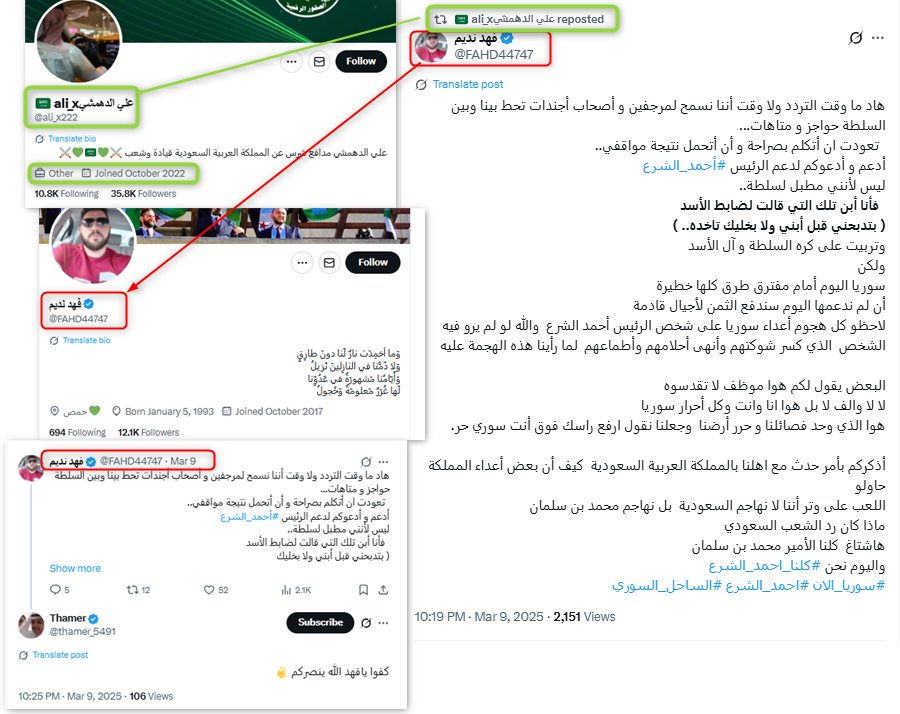
The Events of the Syrian Coast
On March 9, 2025, with the onset of events along the Syrian coast, online activity increased significantly. Posts using the same hashtag and expressing support for al-Sharaa became more frequent. Among the most notable was the account of Fahd Nadeem (@FAHD44747), whose posts received support from Saudi accounts such as Ali al-Dahmashi (@ali_x222), a recently created Saudi account that described itself as a “fierce defender of the Kingdom of Saudi Arabia.”
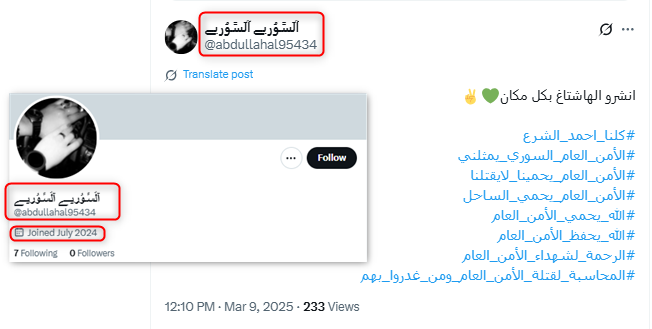
Other accounts also took part, such as @abdullahal95434 — a recently created account dating back to 2024 that describes itself as Syrian. What’s suspicious about the account is that it has posted 200 times, all in the form of replies only, without a single original post, reflecting an almost automated behavior.
Accounts Actively Participating in al-Sharaa Support Campaigns
From January 22, 2025, until September 2025, around 31,500 posts containing the hashtag #كلنا_أحمد_الشرع (We Are All Ahmad al-Sharaa) appeared on social media platforms, averaging about 125 posts per day.
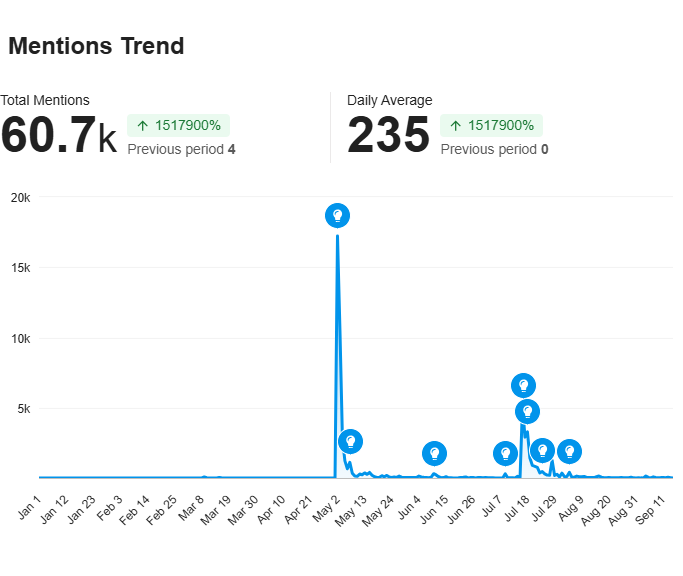
The number of posts peaked on May 2, 2025, coinciding with an Israeli airstrike on the presidential palace in Damascus and the eruption of clashes between Syrian security forces and armed Druze groups in the Sweida region.
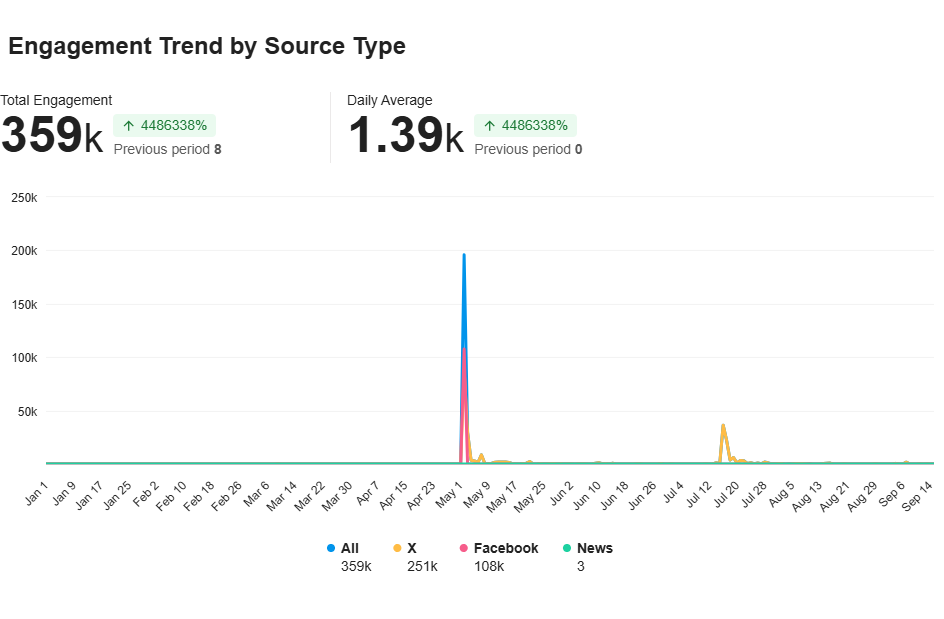
To identify accounts actively participating in pro-Ahmed al-Sharaa campaigns, we obtained a sample of 20,000 data points via Meltwater. We then applied a multi-dimensional analysis. At the first level, we generated a list of the most active accounts, based on posts that received the highest engagement.
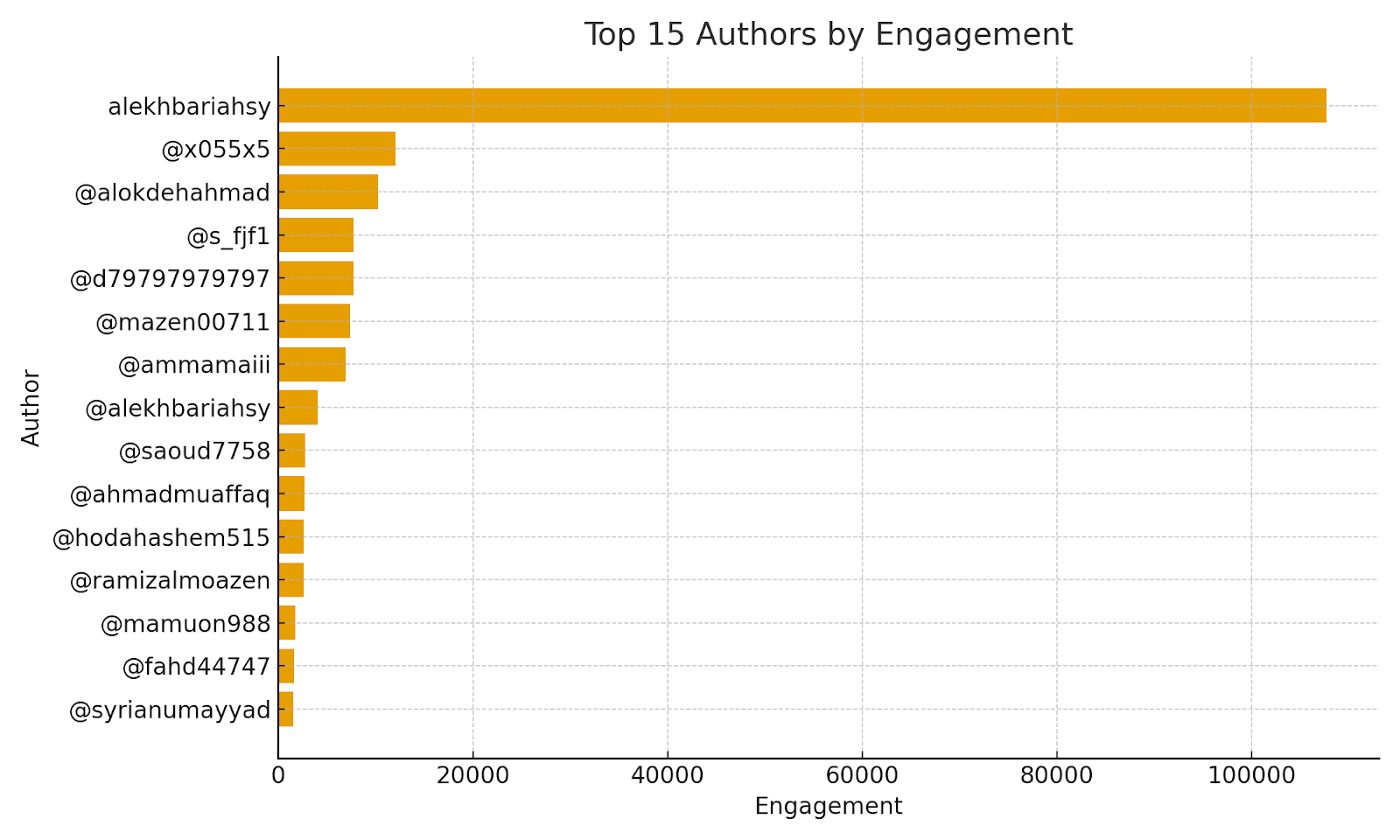
Coming in first place was a post from the Syrian news page Al-Ikhbaria Syria, published on May 2, 2025, about an electronic campaign launched by "activists" under the hashtag “We Are All Ahmed al-Sharaa”, with many comments including the same hashtag.
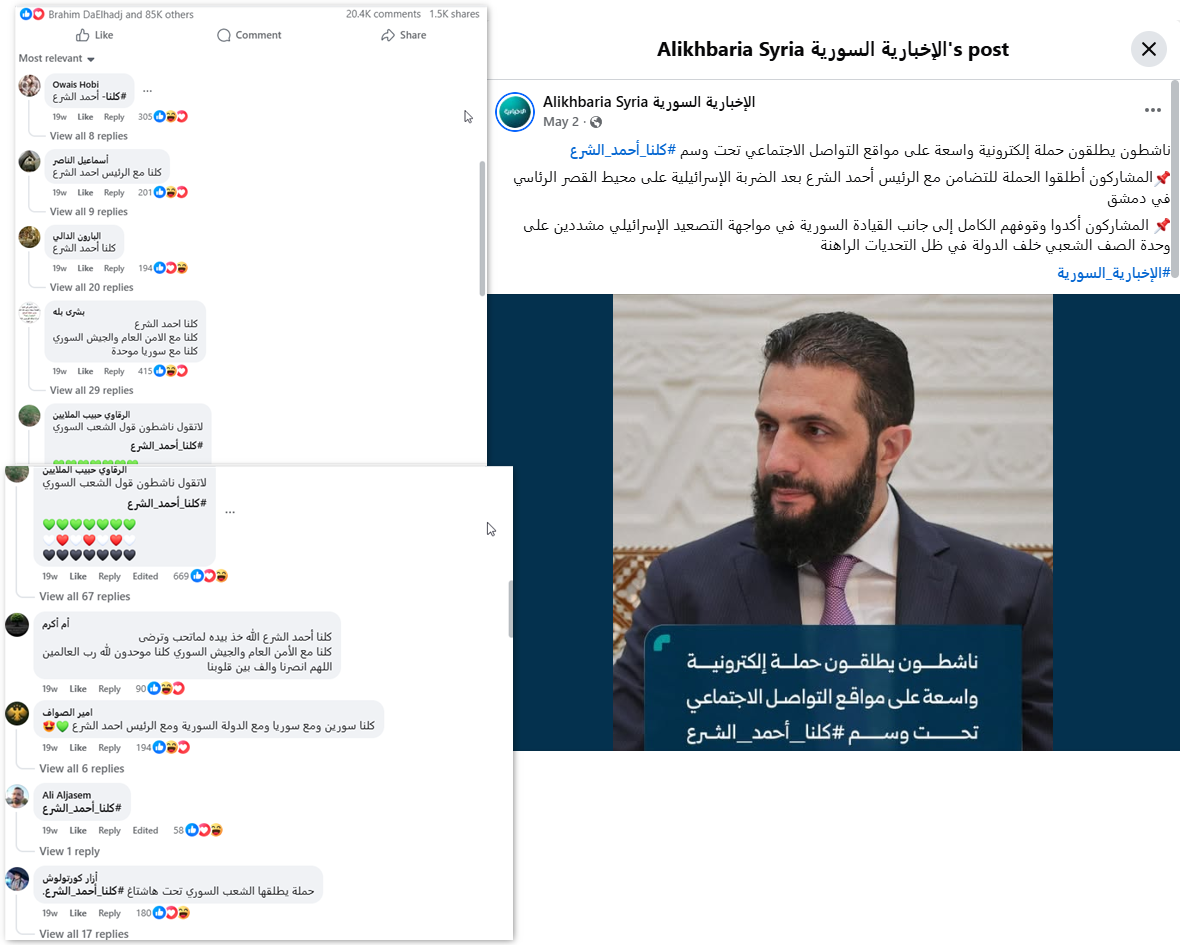
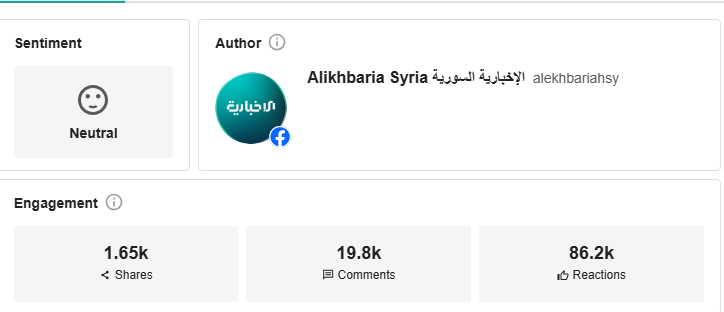
Al-Ikhbariya Syria TV channel identifies itself on its page as broadcasting from Damascus. However, the page's data revealed that it had changed its name three times, most recently in April 2025. A name change is often an indicator of a change in management. The data also showed that the page is managed by four people: two in Syria and two in Turkey.
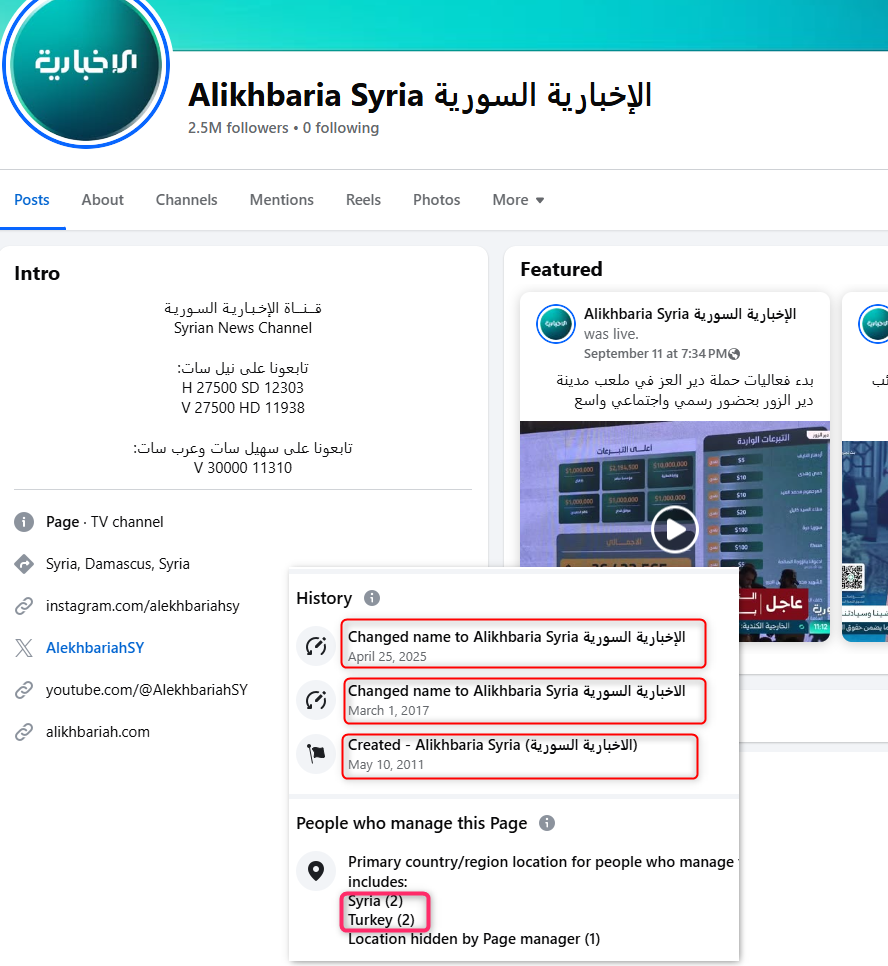
The page was linked to a test site of the 'General Authority for Radio and Television – Syria'. The domain name was registered in the United States in 2019 and updated in June 2025.
Among the most active accounts was that of Saudi influencer and businessman Ghazi Al’anzi (@x055x5). Known for his social media activity, Al’anzi sparked controversy by offering a million dollars for the head of Hikmat al-Hijri, the Druze sheikh who opposes the new authority. He also significantly contributed to the widespread reach of the hashtag "We Are All Ahmed al-Sharaa" by urging his followers to engage with it.
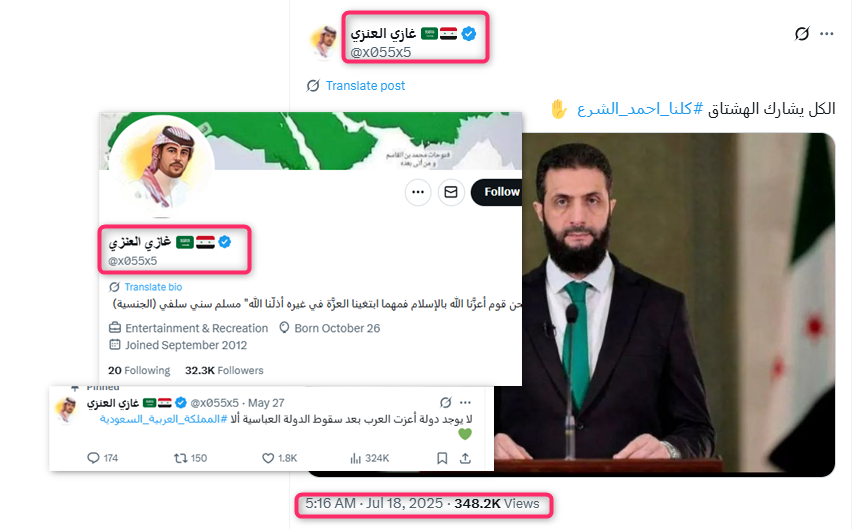
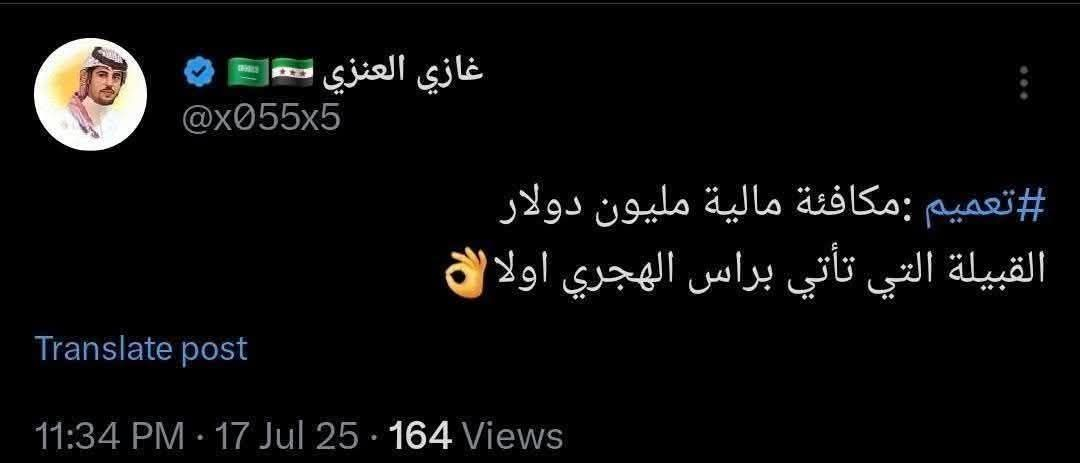
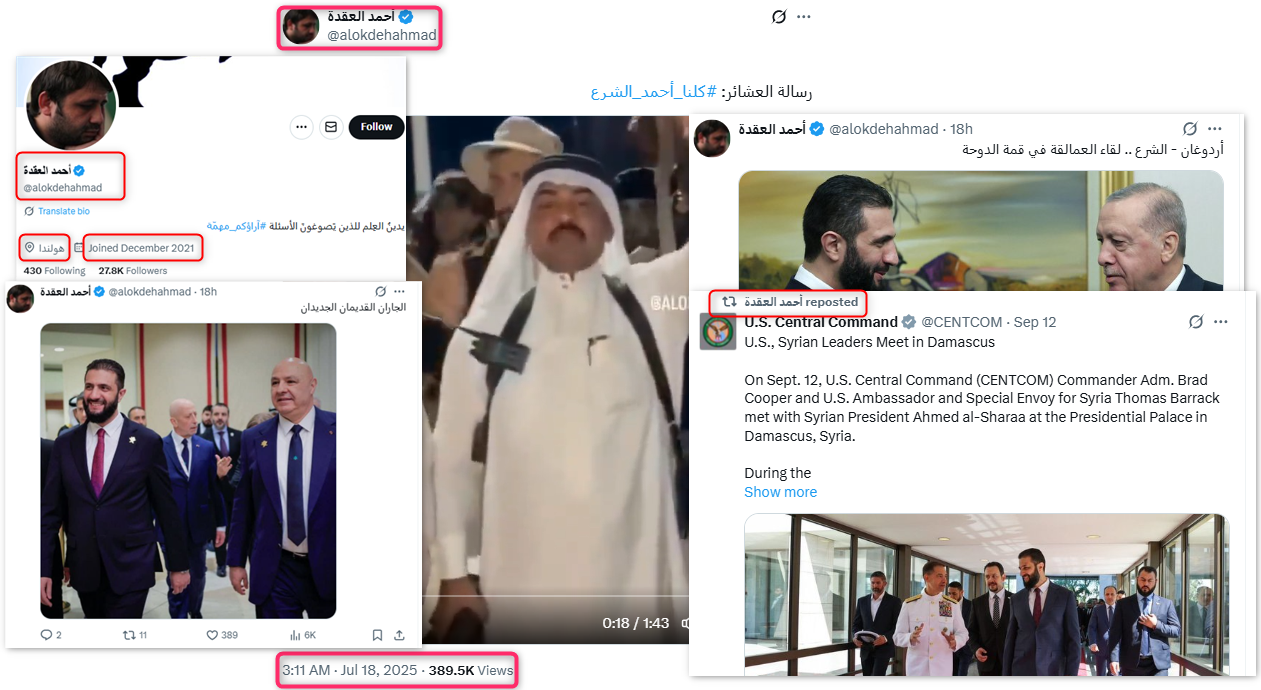
Ranked third among the most active accounts was one named Ahmad al-Okdeh (@alokdehahmad). One of his posts was linked to a video featuring a member of the Syrian tribes during the events in Sweida, titled “A Message from the Tribes: #كلنا_أحمد_الشرع” (We Are All Ahmad al-Sharaa).
Created in 2021, the account lists the Netherlands as its location. Its activity consistently features propaganda posts promoting al-Sharaa.
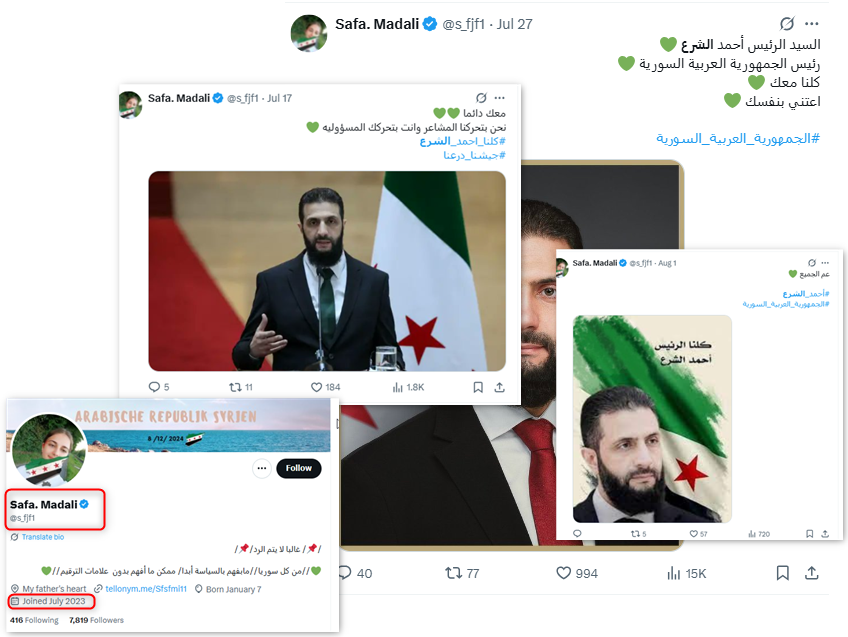
Safa Madali, a Syrian account that publishes political propaganda for the interim government and its head, Ahmed al-Sharaa, came in fourth place on the list of accounts that attracted the most interaction on the hashtag.
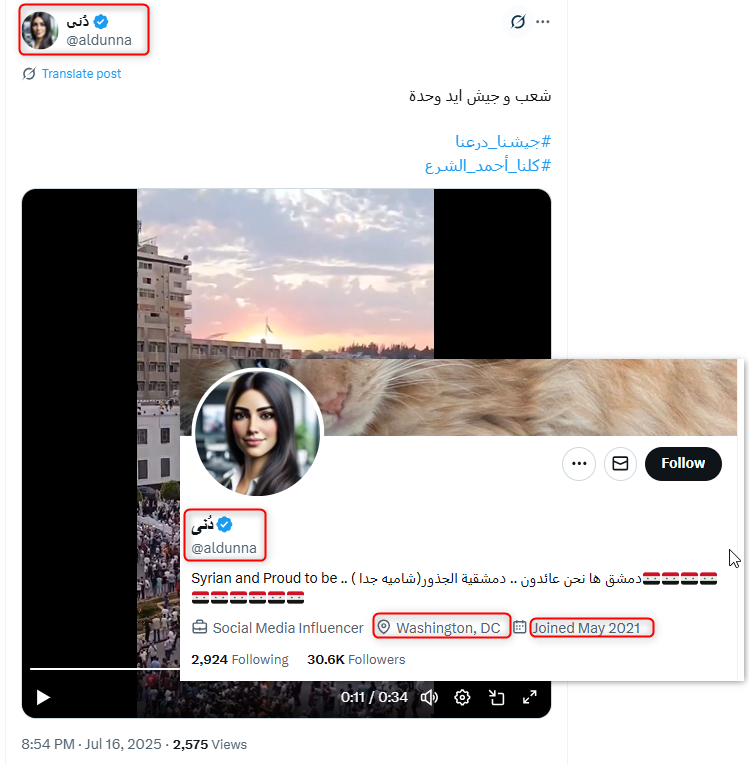
Ranked fifth among the most active accounts was one named Dunna (@aldunna). The displayed username differs from the one registered in the account data, suggesting that the account had recently changed its name. This account was created in 2021, and its user listed their location as Washington. The profile picture is not genuine, and a review of the account’s activity shows that it is limited to posting political content, with no personal posts of any kind.
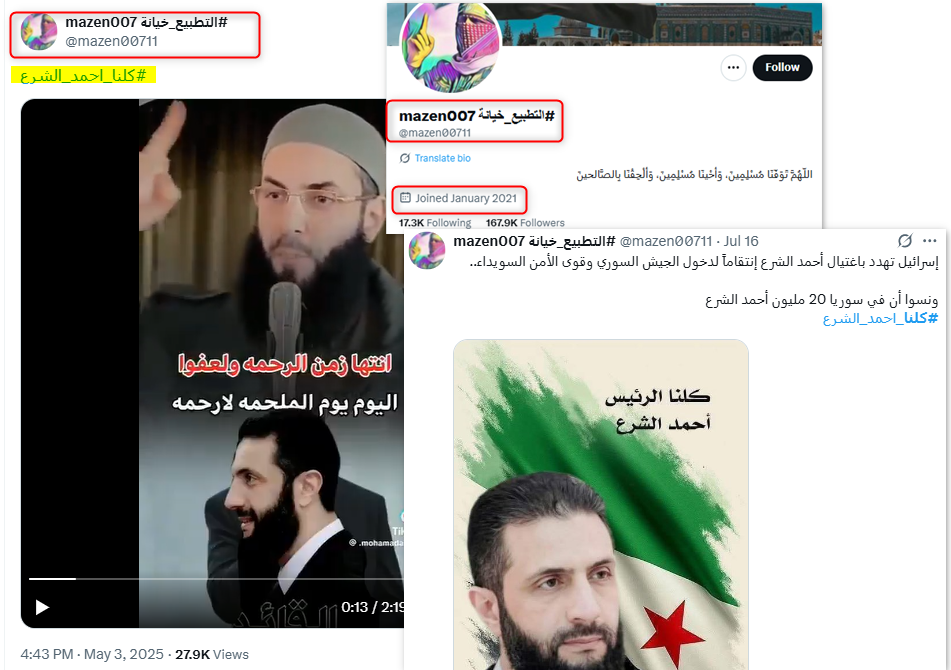
Another Syrian account called "mazen007 Normalization_is_treason# @mazen00711" appeared. It is a relatively new account, publishing only political posts and no personal content.
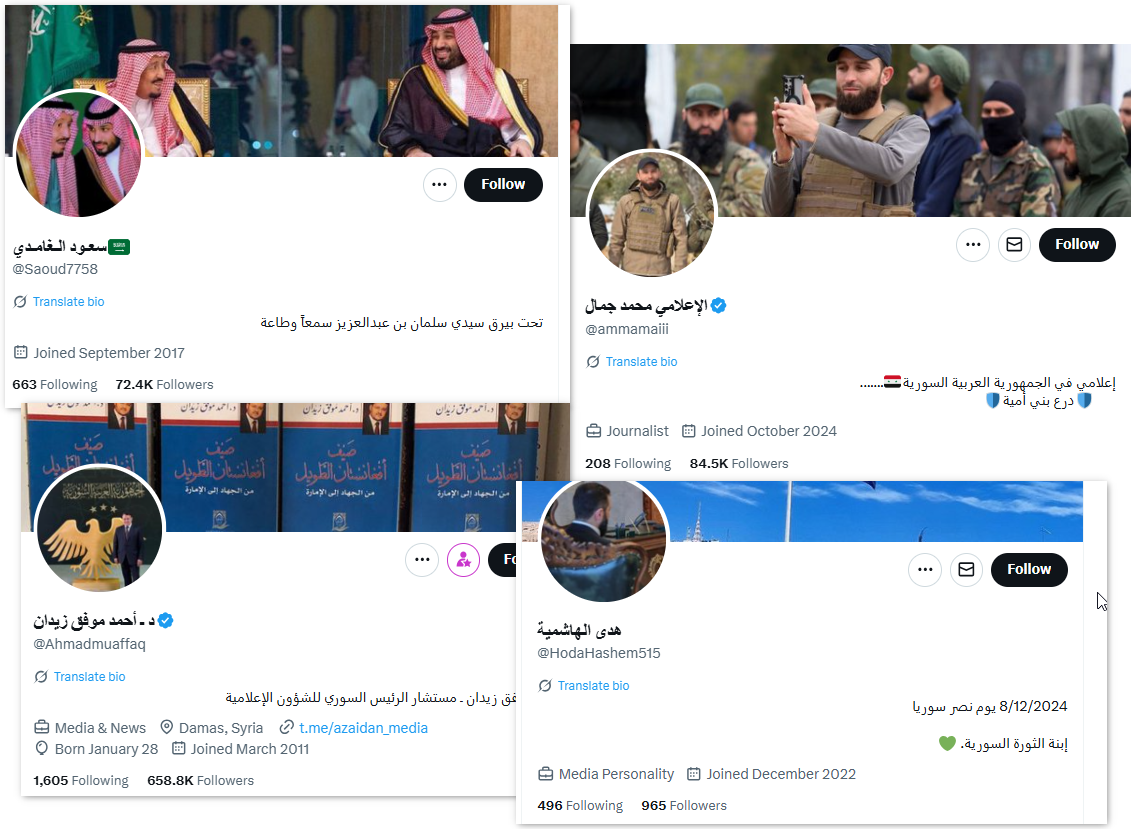
The hashtag's most popular posts were shared by an equal number of Syrian and Saudi accounts. Among the Syrian accounts were verified, active users like Ahmad Mouaffaq Zaidan, as well as newer accounts dedicated to political promotion. Political accounts emerged as influential voices supporting the Syrian transitional government.
Asian Accounts Supporting Ahmad al-Sharaa
At the second level of analysis, data review produced a list of the accounts most frequently posting and interacting with the hashtag #كلنا_أحمد_الشرع (We Are All Ahmad al-Sharaa). At the top of the list was the account (@AbwFda78841), named Fidaa, which posted 205 times—192 of them as comments—showing an almost automated behavior pattern.
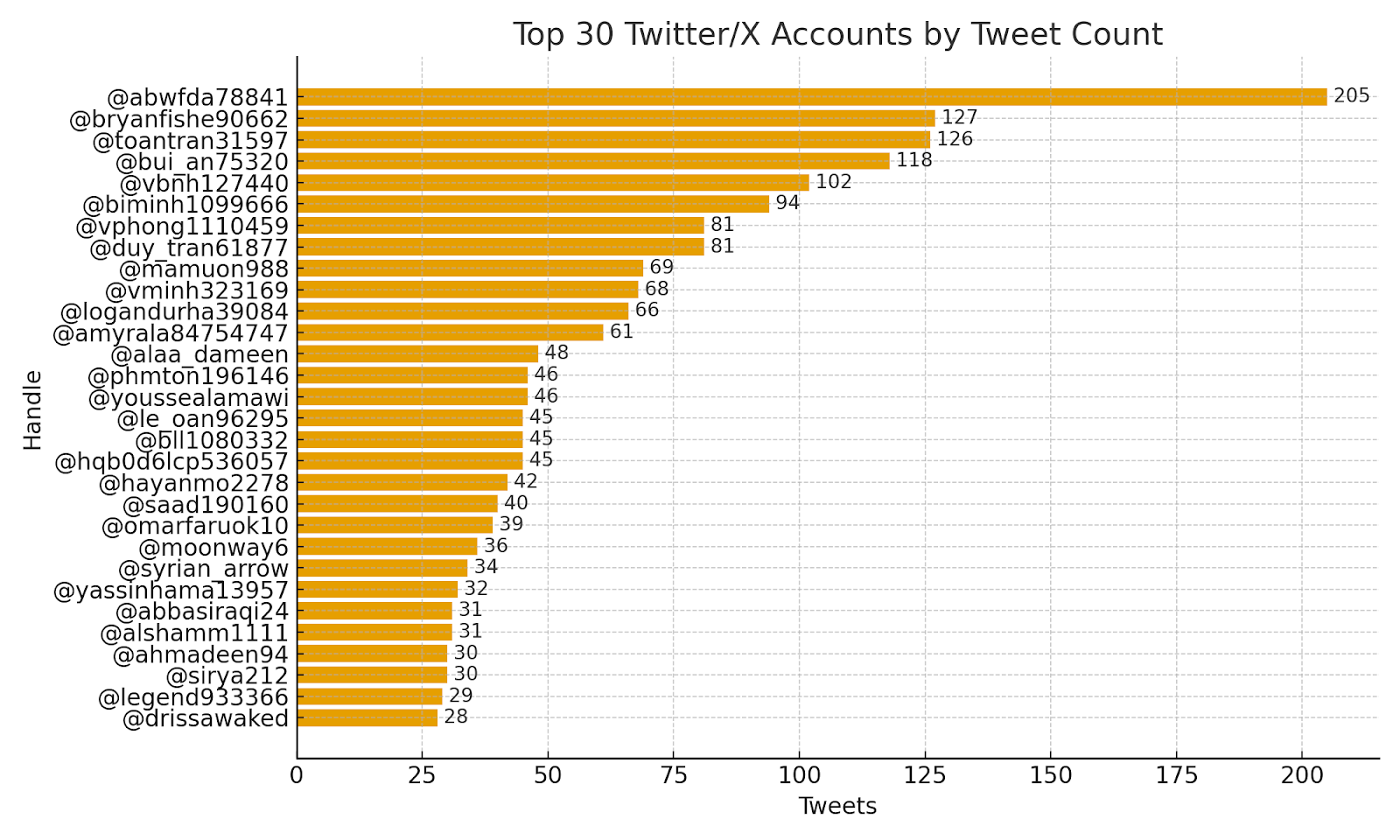
The account (@AbwFda78841) is recent, having appeared in 2024. It publishes posts supportive of the Syrian government but heavily focuses on promoting Syrian-Saudi relations.
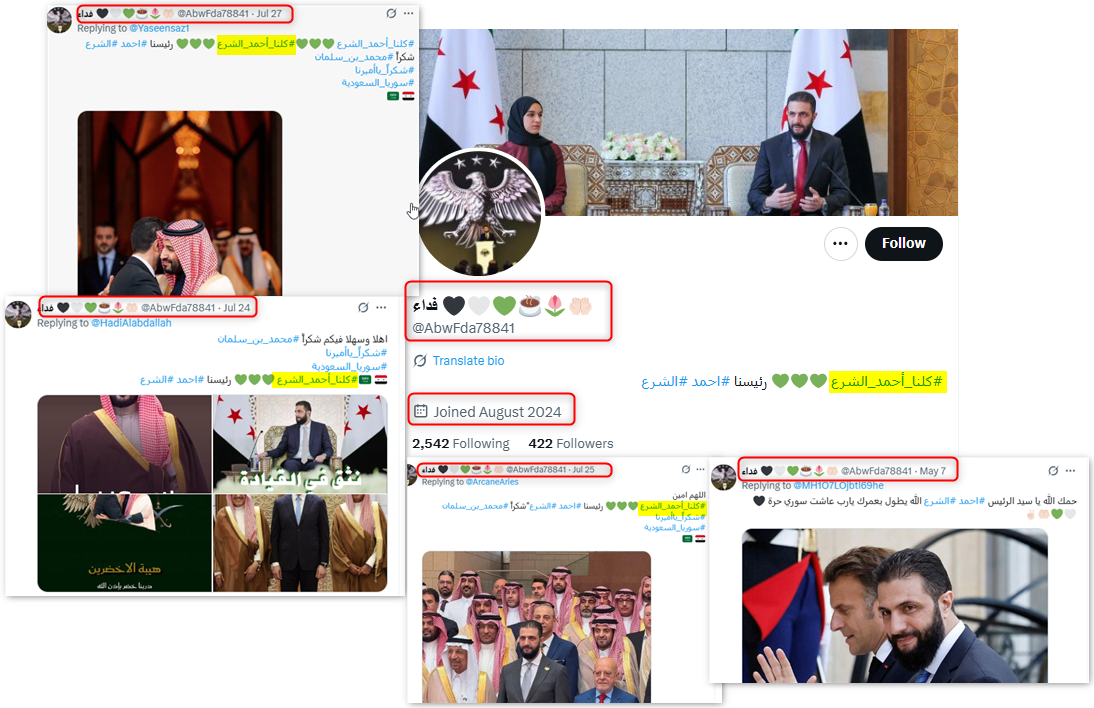
In second place on the list of most active accounts was Bryan Fisher (@BryanFishe90662), who published 127 posts, all original.
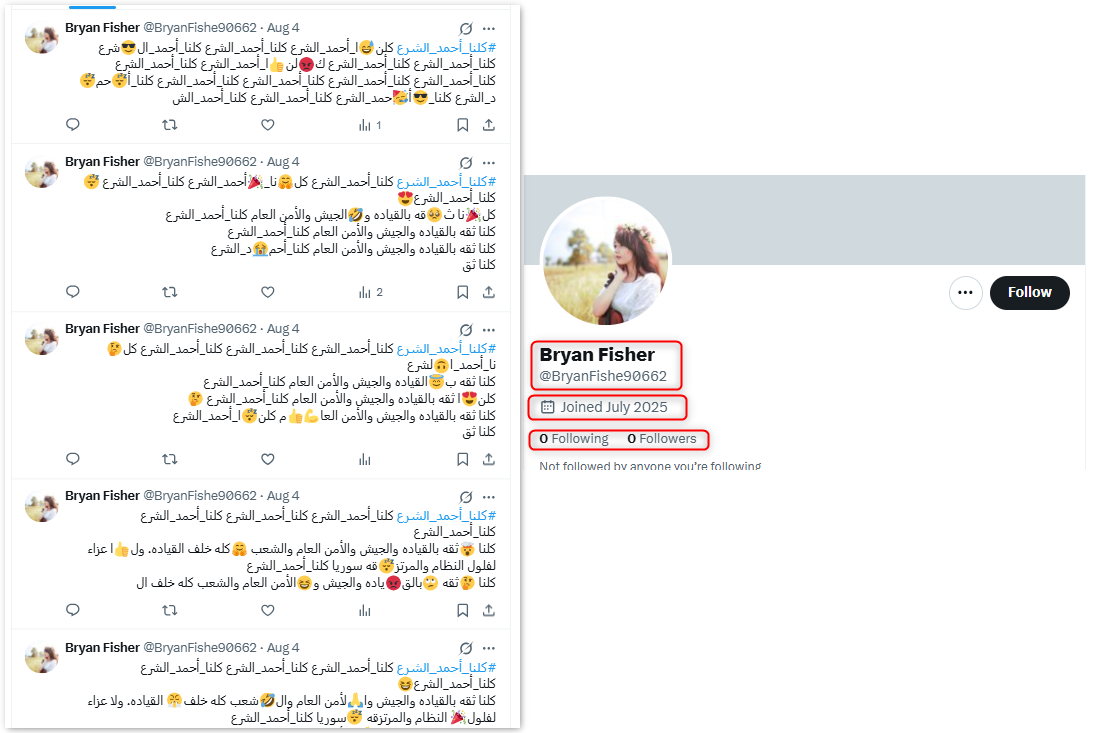
But a review of the account showed that it was recently created, uses a fake image, and its name or username does not reflect the identity of a real person. The account also has no followers and does not follow any other accounts, and almost all of its posts are similar and repetitive.
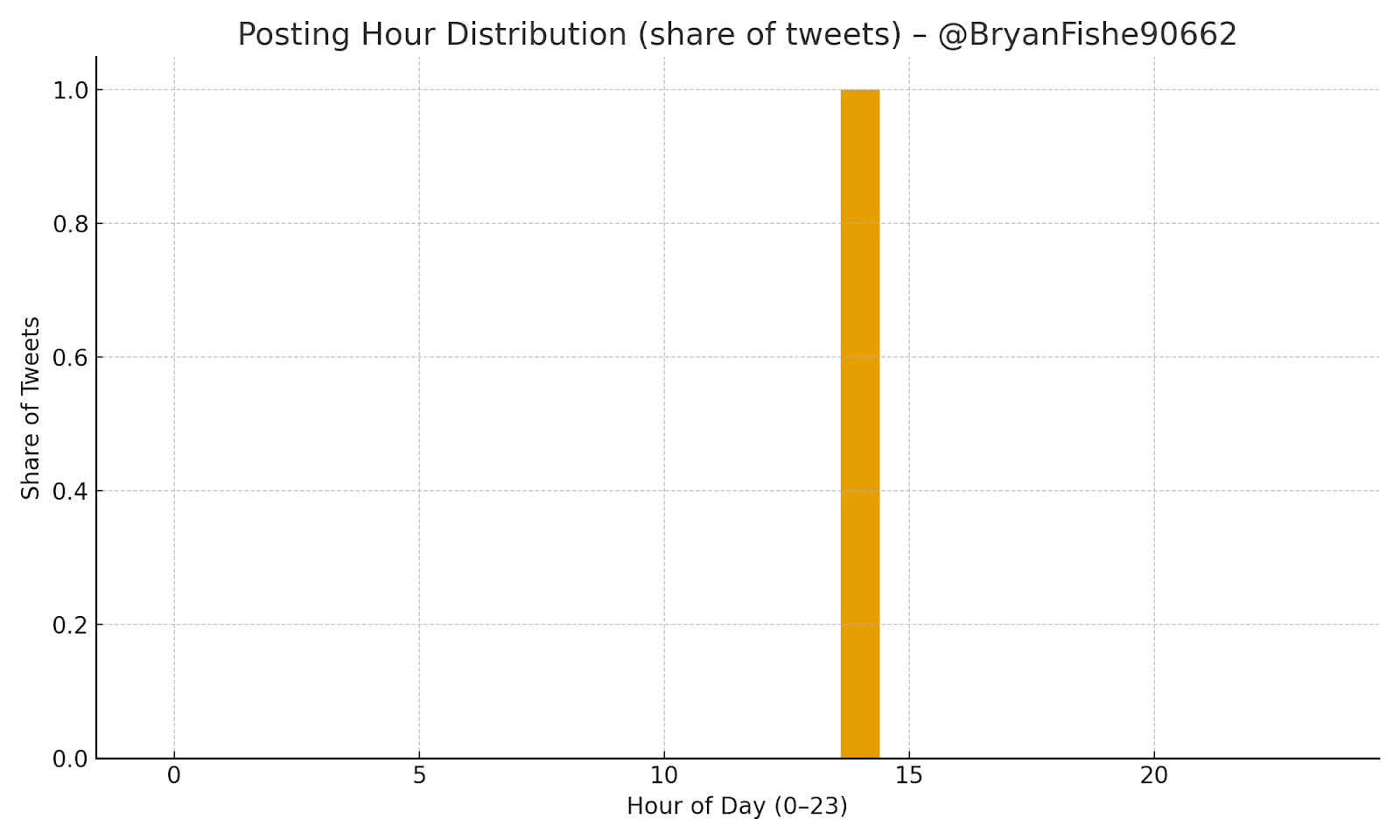
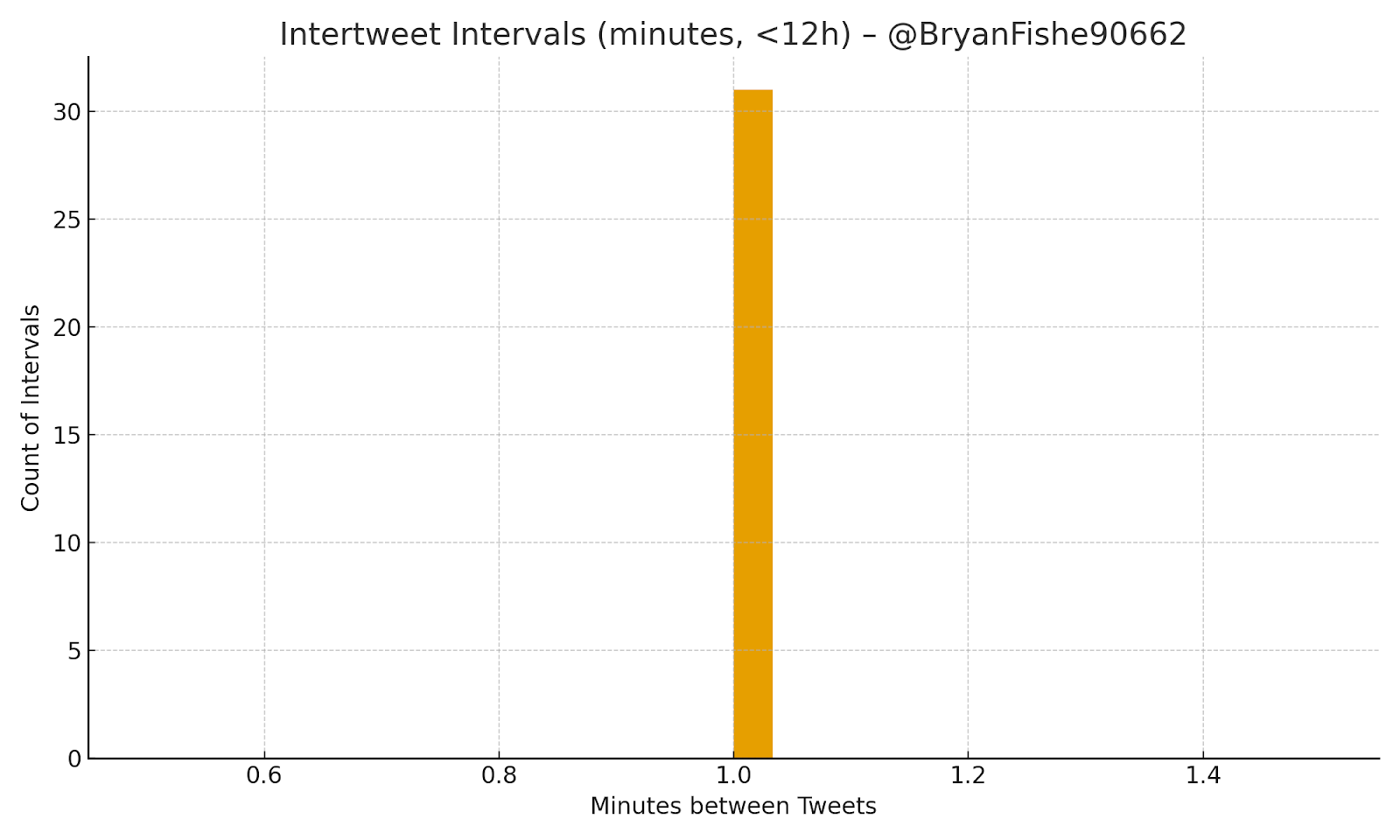
أAnalysis of posting times showed that most of the account's posts were broadcast within just one hour on August 4, which is a clear indication that it is a fully automated account.
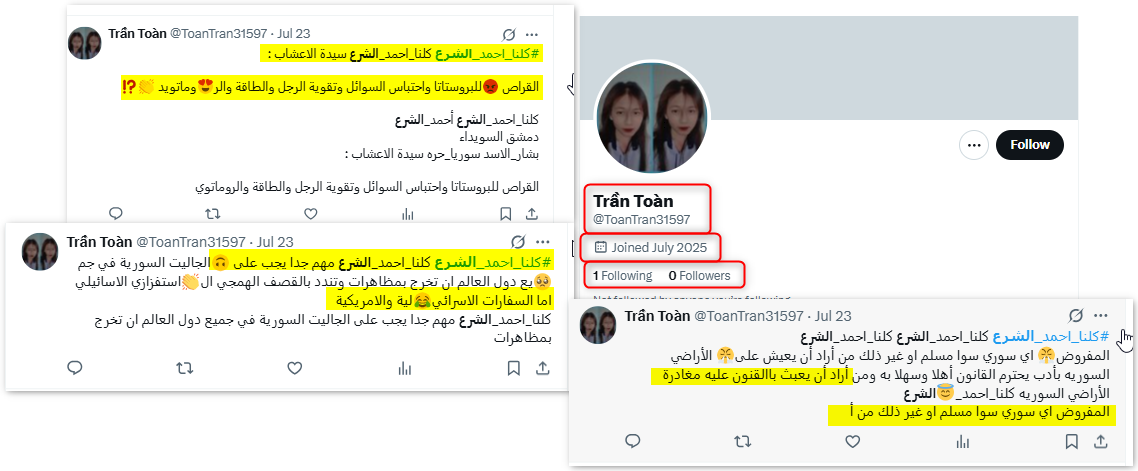
Trần Toàn (@ToanTran31597) came in third, a new account that posted 126 times. The account shared the same characteristics as the previous one: no real picture, vague names, and no followers or followed accounts. Further examination of the posts revealed a non-human writing style. This was evidenced by significant contextual overlap, excessive and inappropriate emoji use, and numerous spelling errors, all pointing to automated content generation.
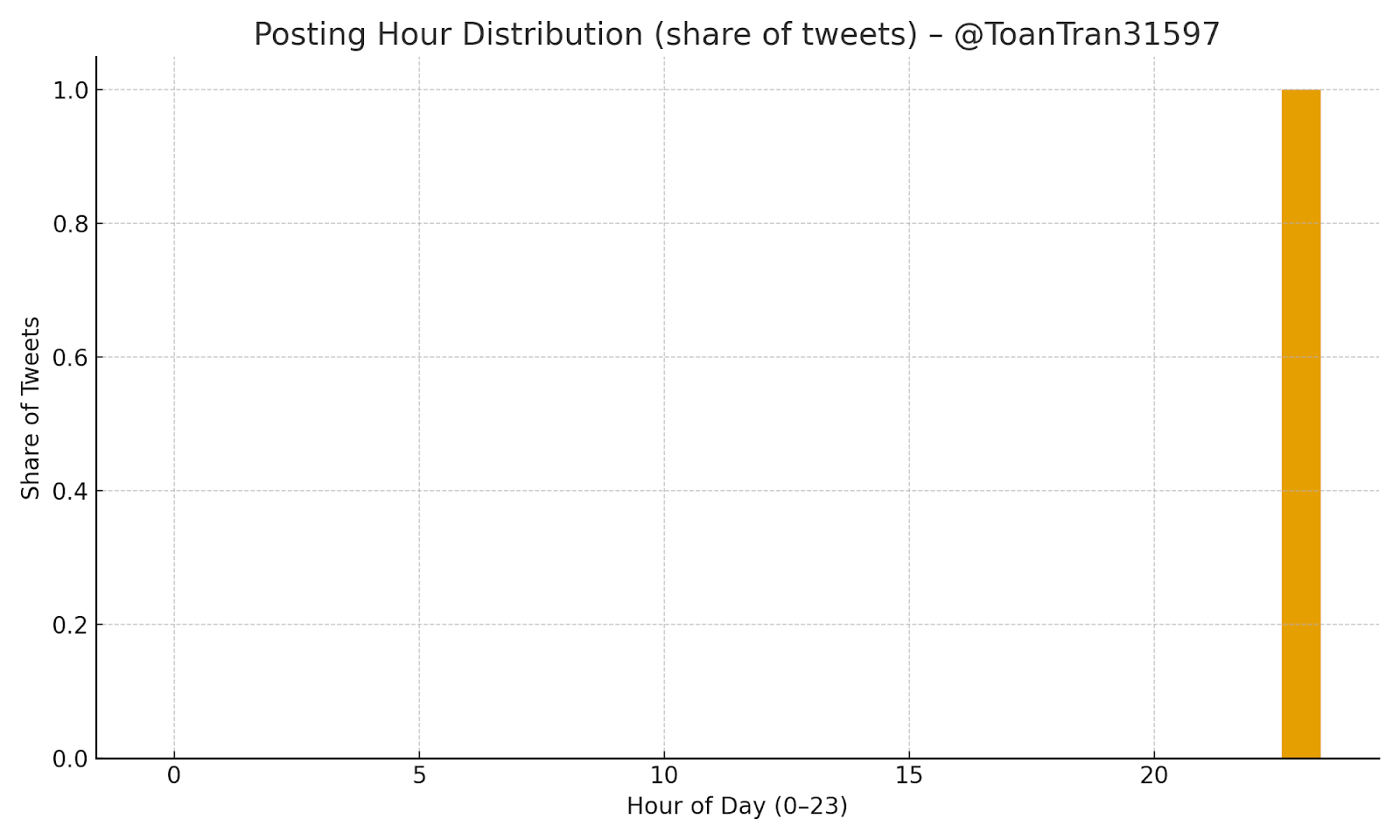
An analysis of the posting times shows that the account published all its posts on July 22 between 23:01 and 23:39. This means that all its posts were injected within less than an hour, which indicates that the account is fully automated.
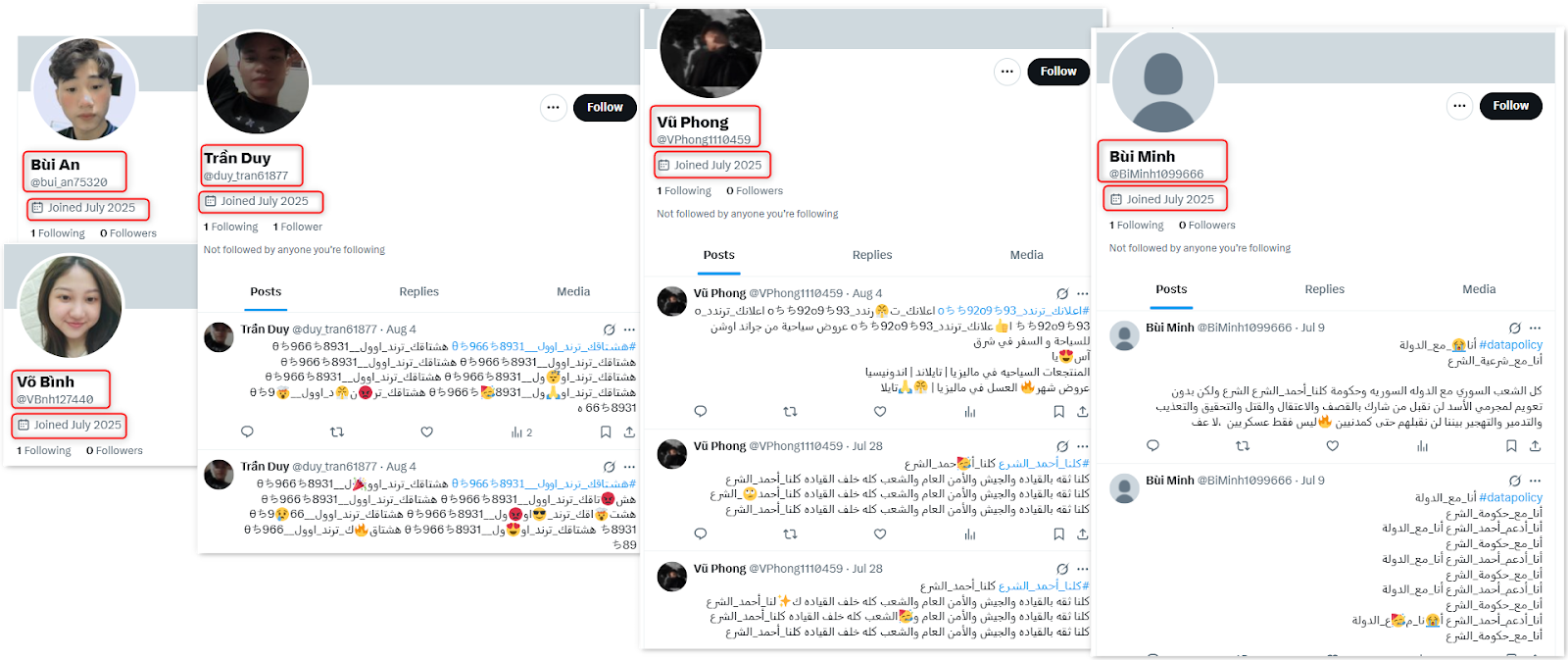
A common thread between the two previous accounts is that they both appeared in July 2025, the same date when five other accounts emerged, topping the list of most active and interactive accounts with the hashtag "We Are All Ahmad al-Sharaa." All these accounts use fake profile pictures of individuals with Asian features and post in the same pattern, suggesting that they may belong to a single entity.
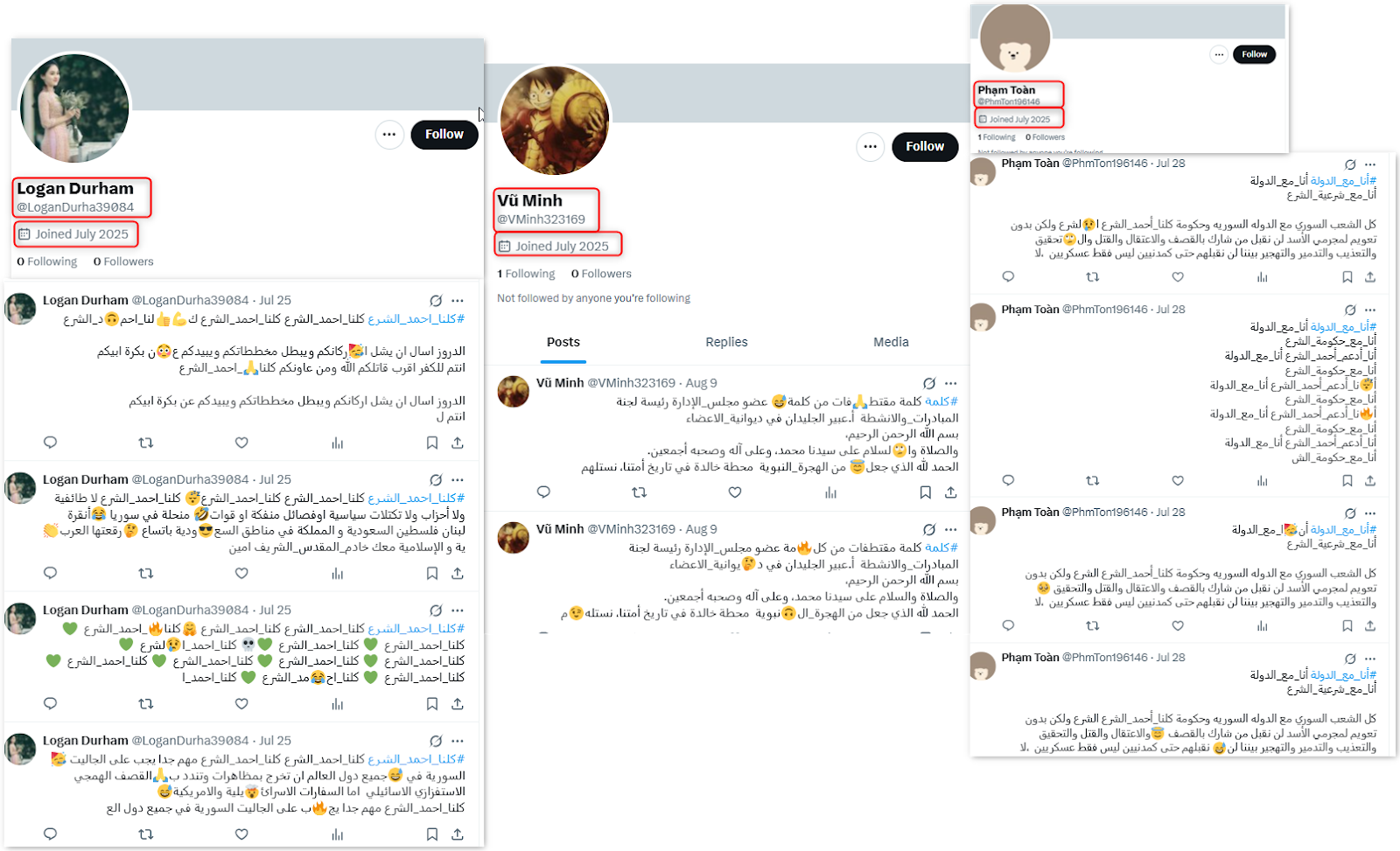
Ten highly interactive accounts on the hashtag displayed identical characteristics. They used fake images of individuals with Asian features and ambiguous names, publishing numerous posts within an hour. The style and format of all their posts were also identical.
The second type of accounts were newly established Syrian accounts, all of which published posts focused on political promotion of the Syrian government, and not did not post any personal content.
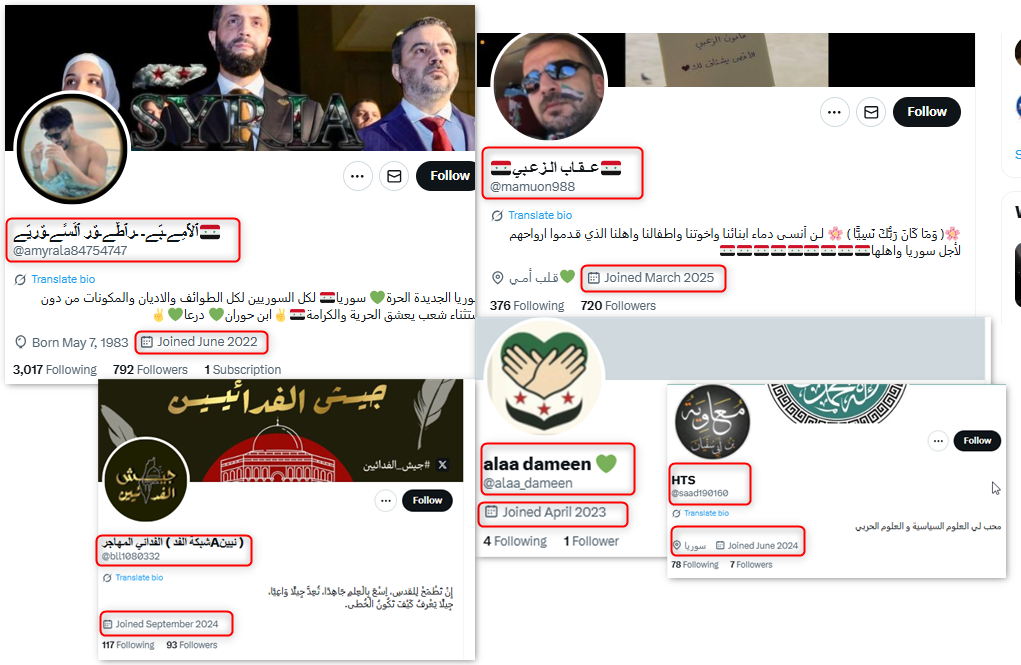
Network Analysis
Next, we performed a network analysis to map the relationships between accounts with the most popular posts and those with the most activity.
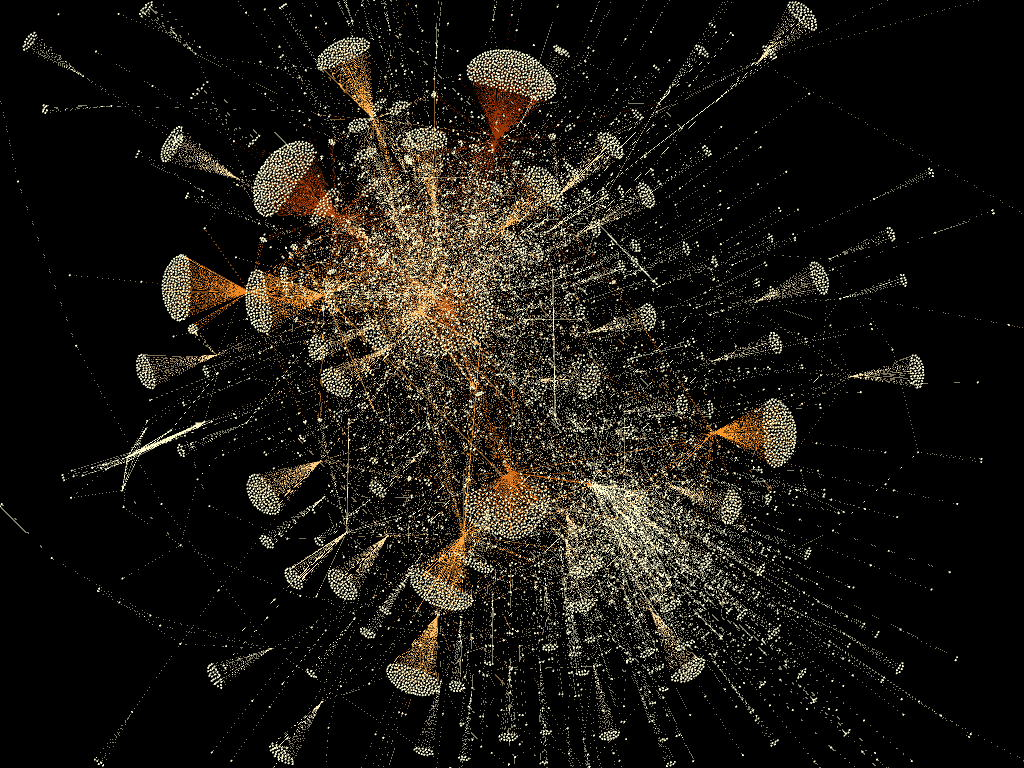
After analyzing the data, we used Gephi to generate a network map of the accounts involved in the campaign—those that participated in promoting and interacting with the hashtag #كلنا_أحمد_الشرع (We Are All Ahmad al-Sharaa). The network was divided into two sections: the lower part consisted of accounts that received the highest engagement through comments, while the upper section represented accounts that gained interaction primarily through reposts.
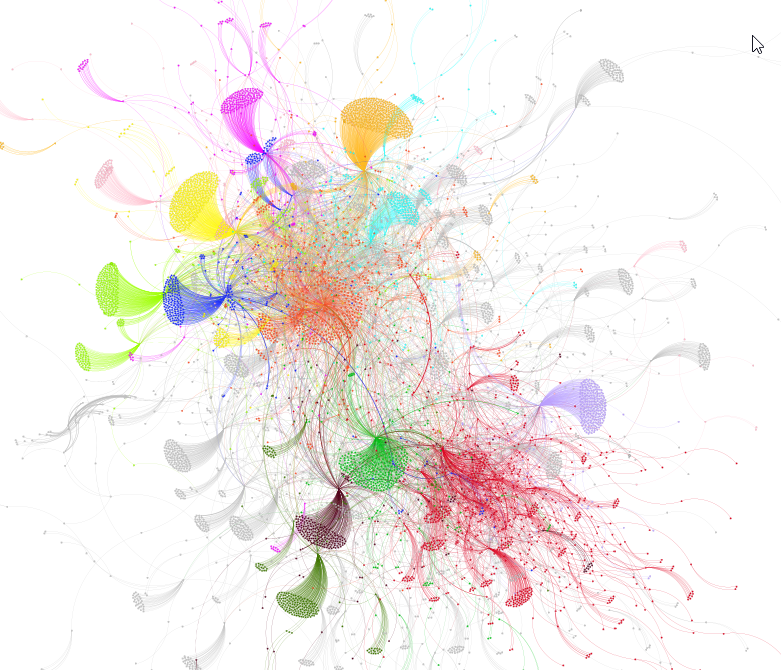
Through statistical analysis, we were able to identify the largest networks within the network map, with the largest community appearing in red and accounting for about 9% of the total network size.
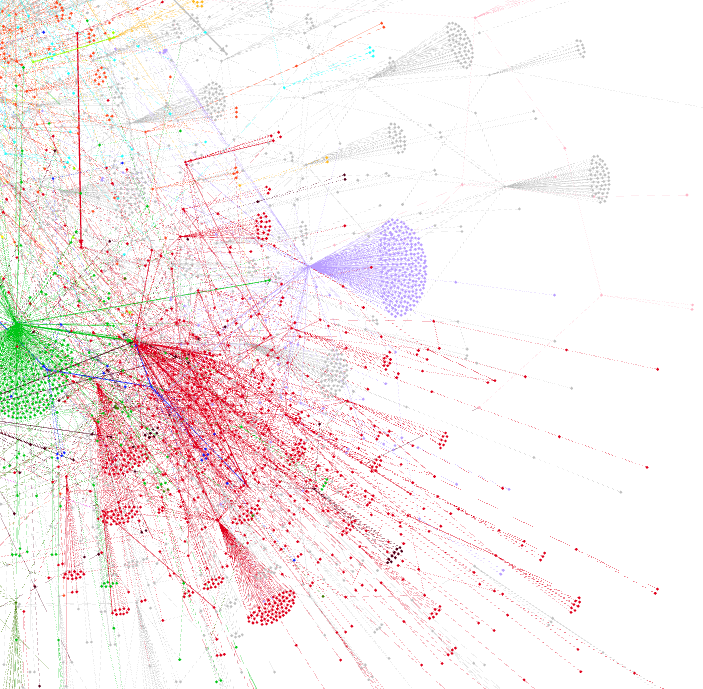
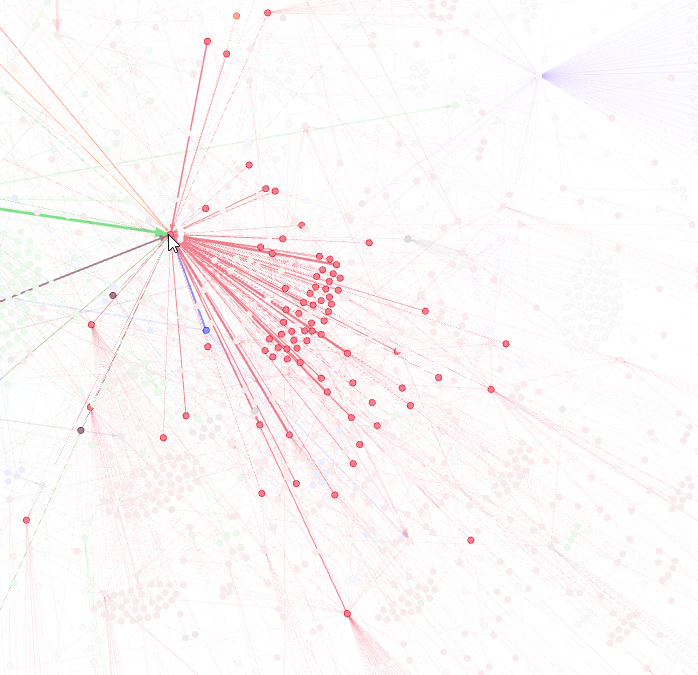
The account @AbwFda78841 was central to this pattern, increasing its comments and interactions with @SyrNetworkNews, a Syrian news network founded in 2024.
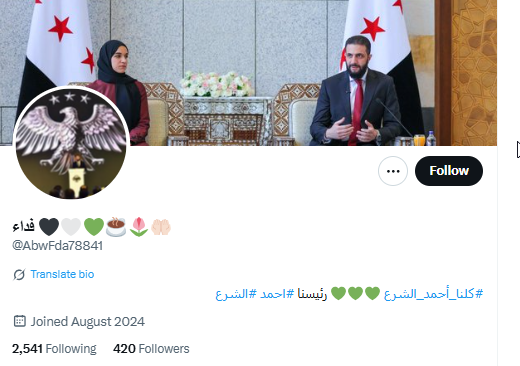
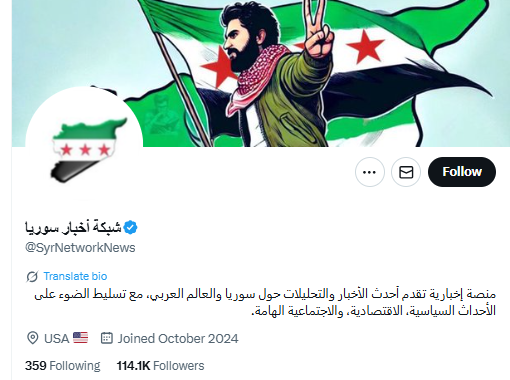
The account was also observed to comment on posts from Al-Ikhbaria Syria which was previously identified in the first stage of analysis. It interacts through comments with the account of Fahd al-Nadeem and also comments on posts from the “Umayyad Syrian News Channel,” an account that displays both the Syrian and Saudi flags. Additionally, it engages with posts by the account “Journalist Mohammed Jamal,” a recently created profile that describes itself as belonging to a journalist and the “Shield of Banu Umayyah.”
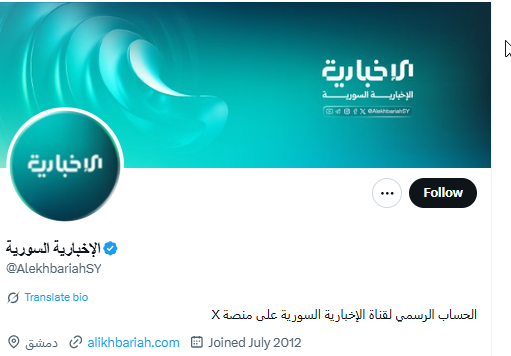
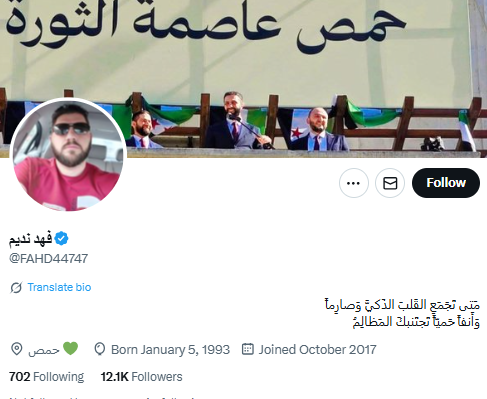
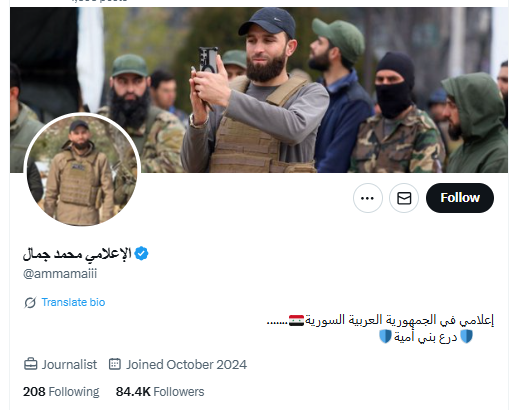
"Fidaa" also sometimes clashes with the "Eddie Cohen" account, leading to "Eddie Cohen" becoming visible on the network. He also interacts by commenting on the "Syrian Arab Republic Presidency" page."
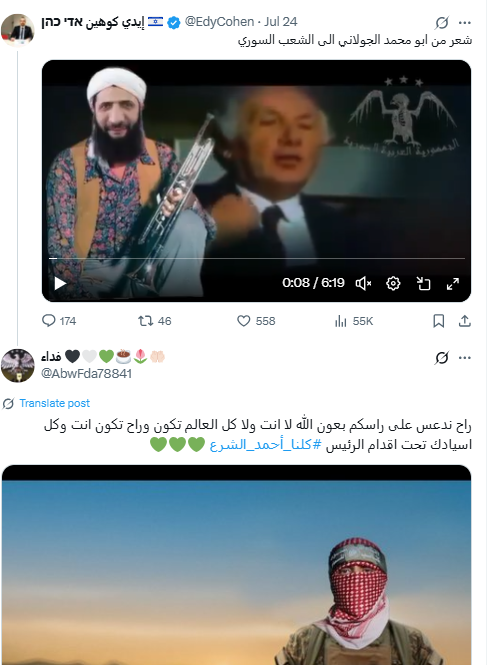
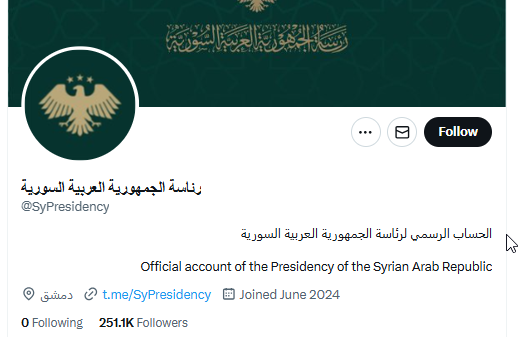
The account in question also interacts with @samfreesyria777, an account we've previously monitored. Within the same network, a new Saudi account emerged: "@alshamm1111," belonging to "Abu Mamdouh Al-Shammari." This account advocates for the Saudi regime and the Syrian Interim Government, and actively promotes the hashtag "We Are All Ahmed al-Sharaa."
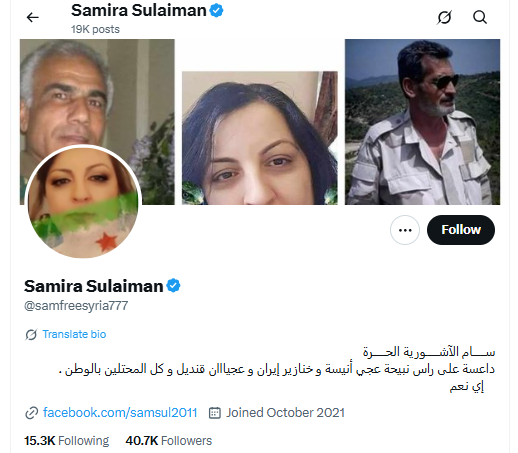
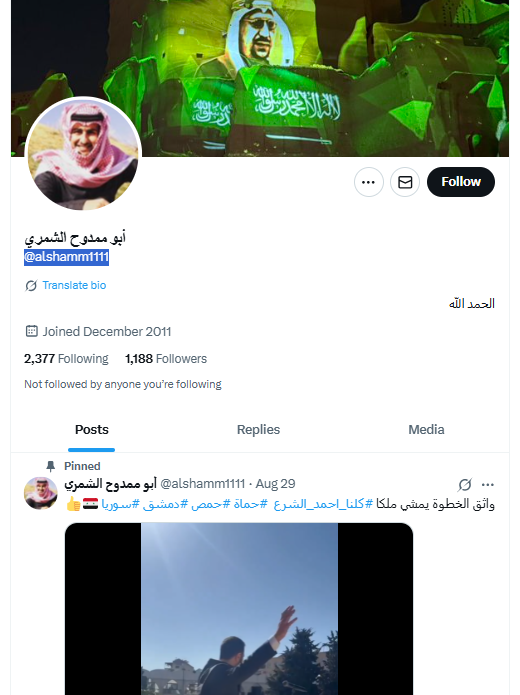
The red network connects directly to three other networks: the green network, which consists of accounts commenting on Dunna’s (@aldunna) account; and the bold network, which represents accounts interacting with Safa Madali’s (@s_fjf) account through comments.
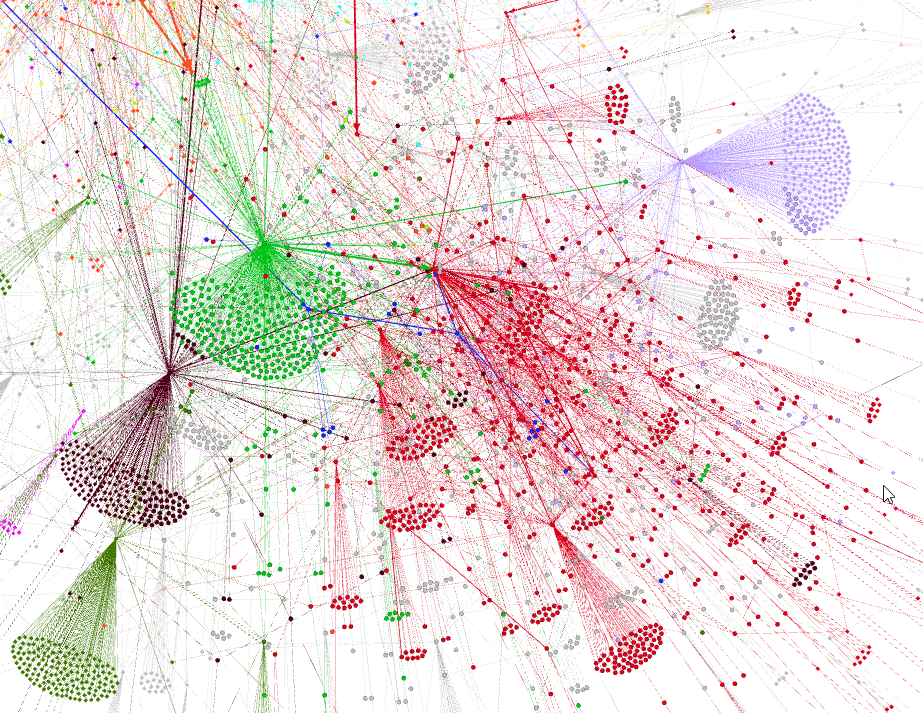
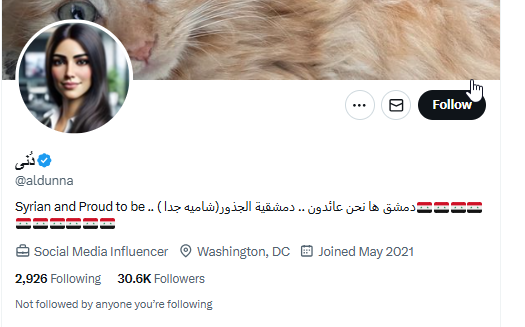
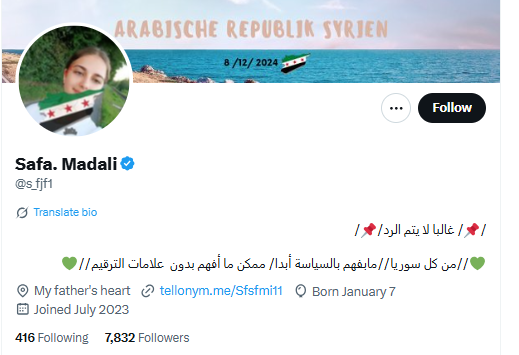
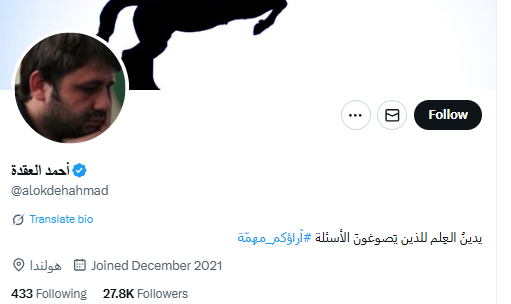
In the same section on account networks that interact by commenting, the account of Ghazi Al’anzi (@x055x5), which we analyzed previously, appeared.
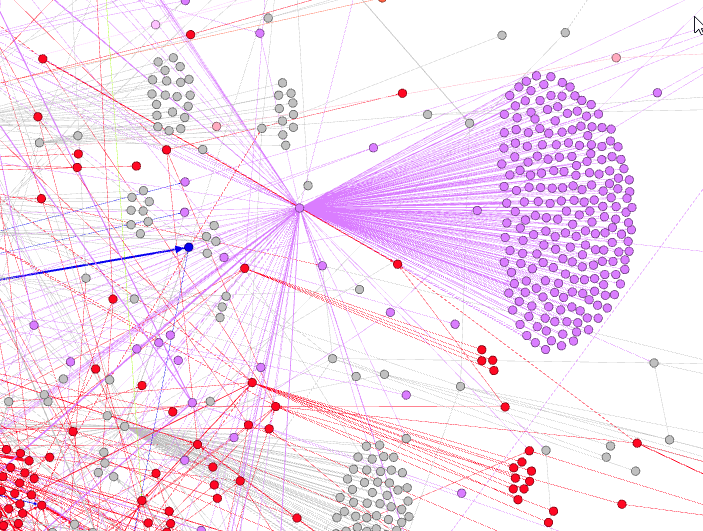
Shifting to the upper map section, which illustrates networks interacting via reposting or quoting, reveals that the previously identified accounts are central to broad groups of accounts that simply repost or quote their content.
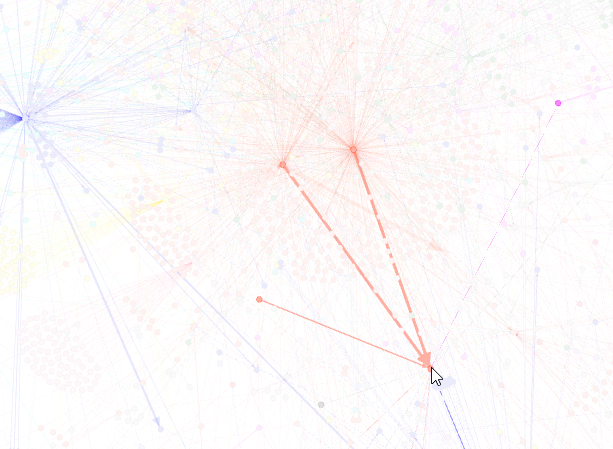
Notably, a network of accounts, centrally located on the network map and interacting through reposts with "Dunna" (@aldunna), Safa Madali (@s_fjf1), and the Saudi account "Hala" (@moonway6), are all connected to a core Syrian account, "Omar al-Farouq" (@omarfaruok10). This central account was instrumental in promoting the hashtag #كلنا_أحمد_الشرع (We Are All Ahmed al-Sharaa).
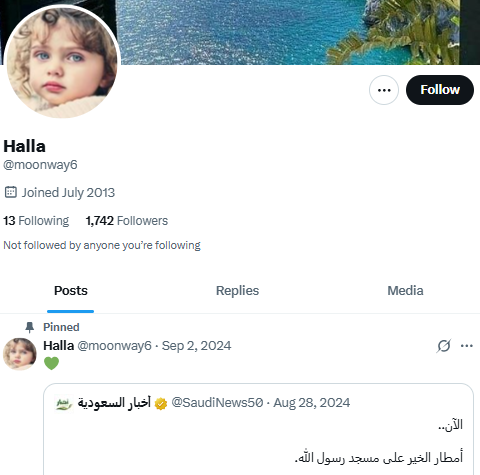
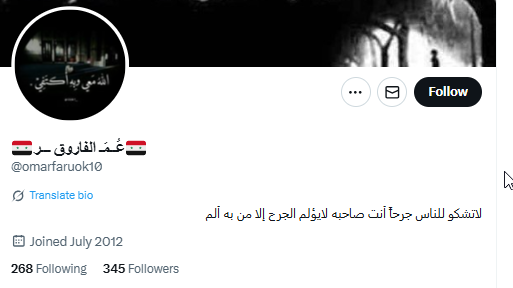
In the same vein, another influential Syrian account named 'Ramiz Almoazen' (@RamizAlmoazen) emerged, consistently dedicated to promoting al-Sharaa.
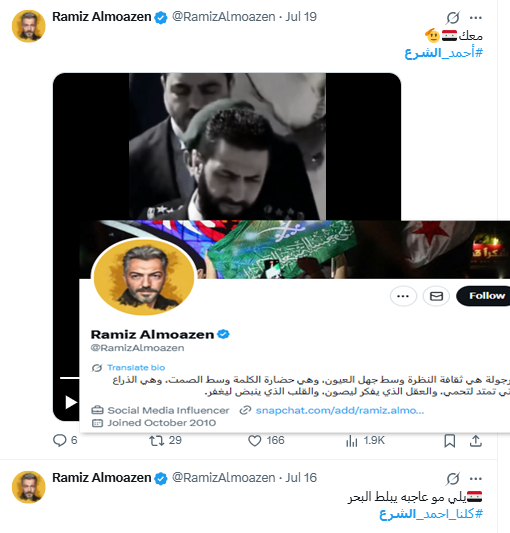
A Saudi account called "Kingdom of Al Saud @jfhdh37517250" also appeared in the same network, which participated in promoting the hashtag "We Are All Ahmed al-Sharaa" and used sectarian discourse against all opponents and adversaries.
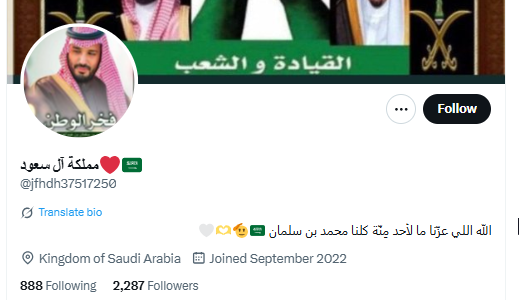
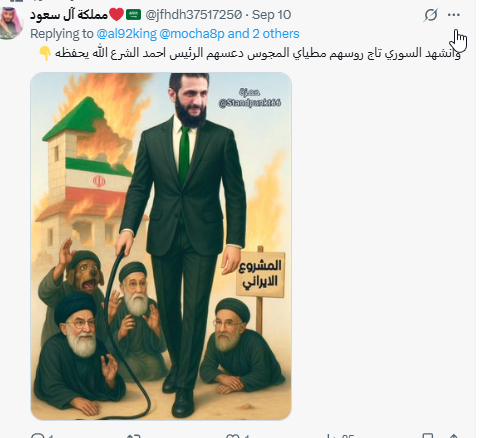
Another Kuwaiti account on the same network, named "Fahad @fahadddd83," also appeared and participated in promoting the same hashtag and contributed to the inflammatory discourse during the events in Sweida.
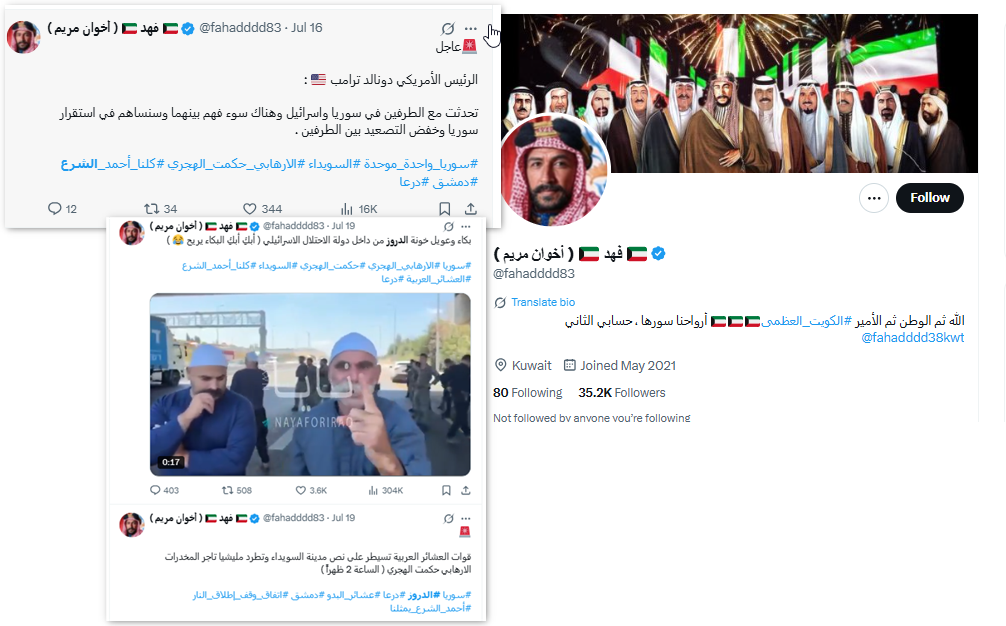
The network analysis shows that the accounts active in promoting the transitional government and its president fall into two main categories.
The first consists of Syrian influencer accounts, whose content is reposted or engaged with through comments by newly created—and in some cases, fake—accounts. These accounts often adopt sectarian rhetoric against opponents and rivals.
The second category is primarily made up of Saudi accounts, along with a few Kuwaiti ones, that defend Ahmad al-Sharaa and use inflammatory, sectarian language against his critics.
Large groups of fake accounts—similar to those identified earlier—also participate in amplifying the politically driven hashtags supporting the interim government and its president, Ahmad al-Sharaa.
